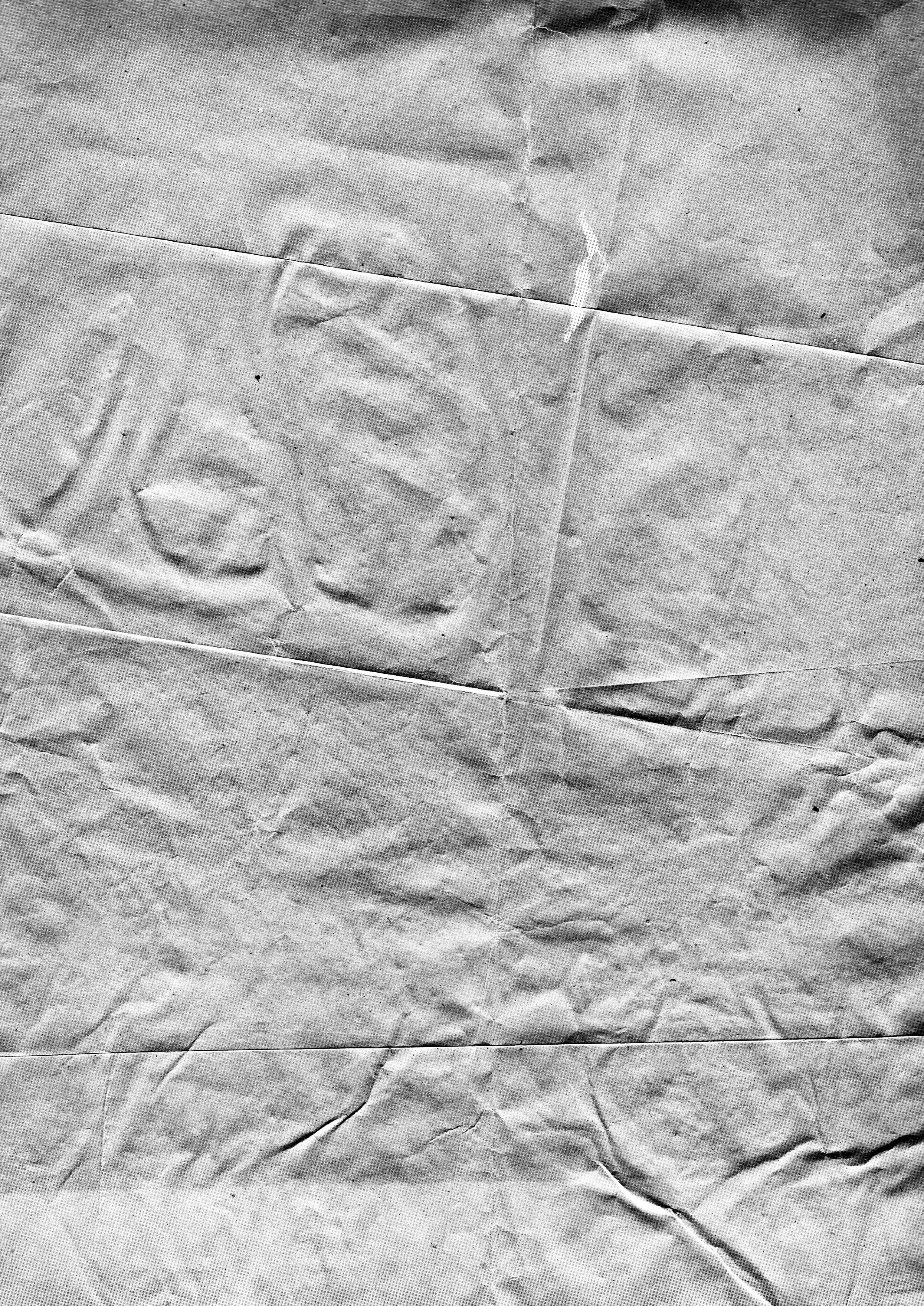
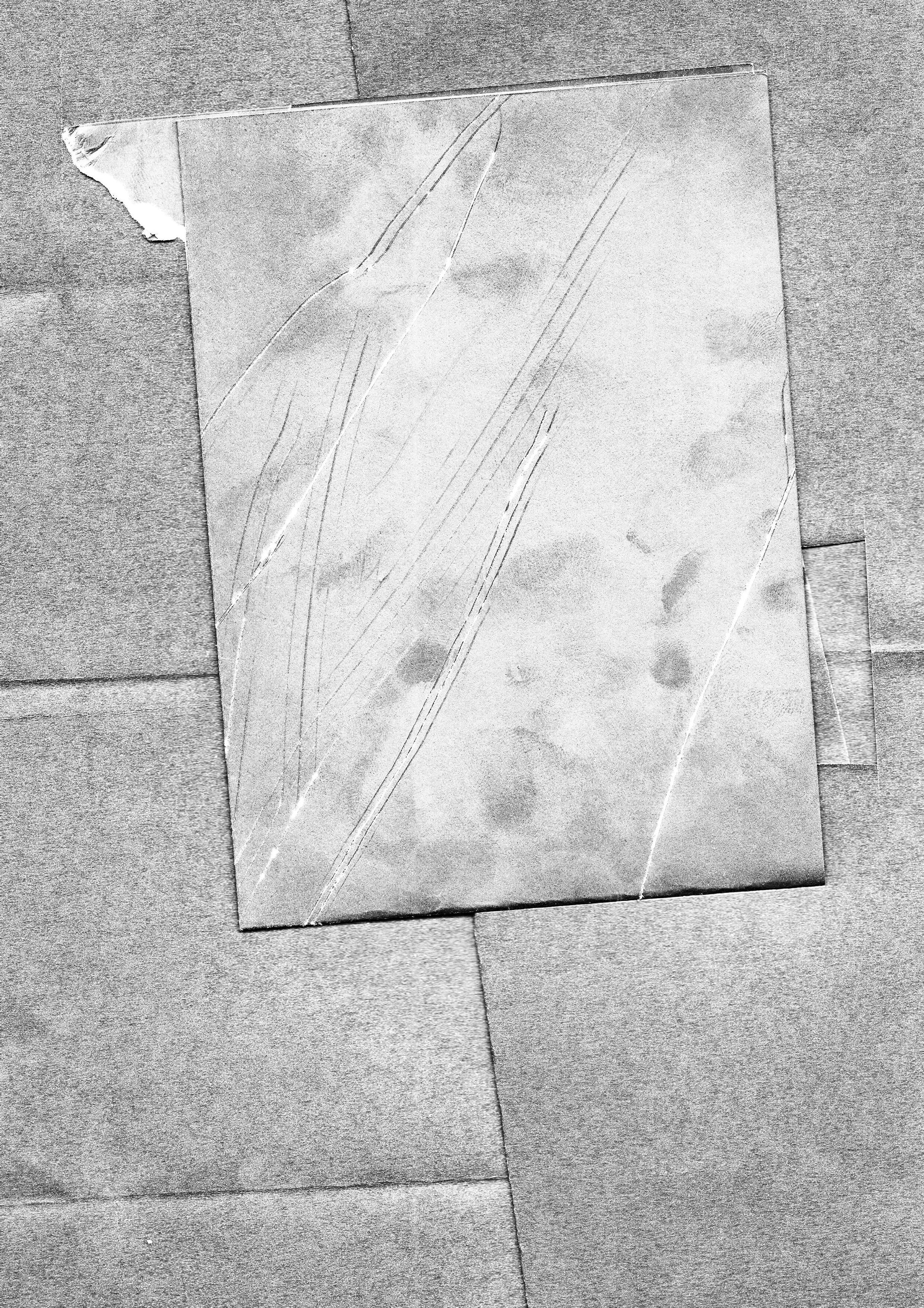
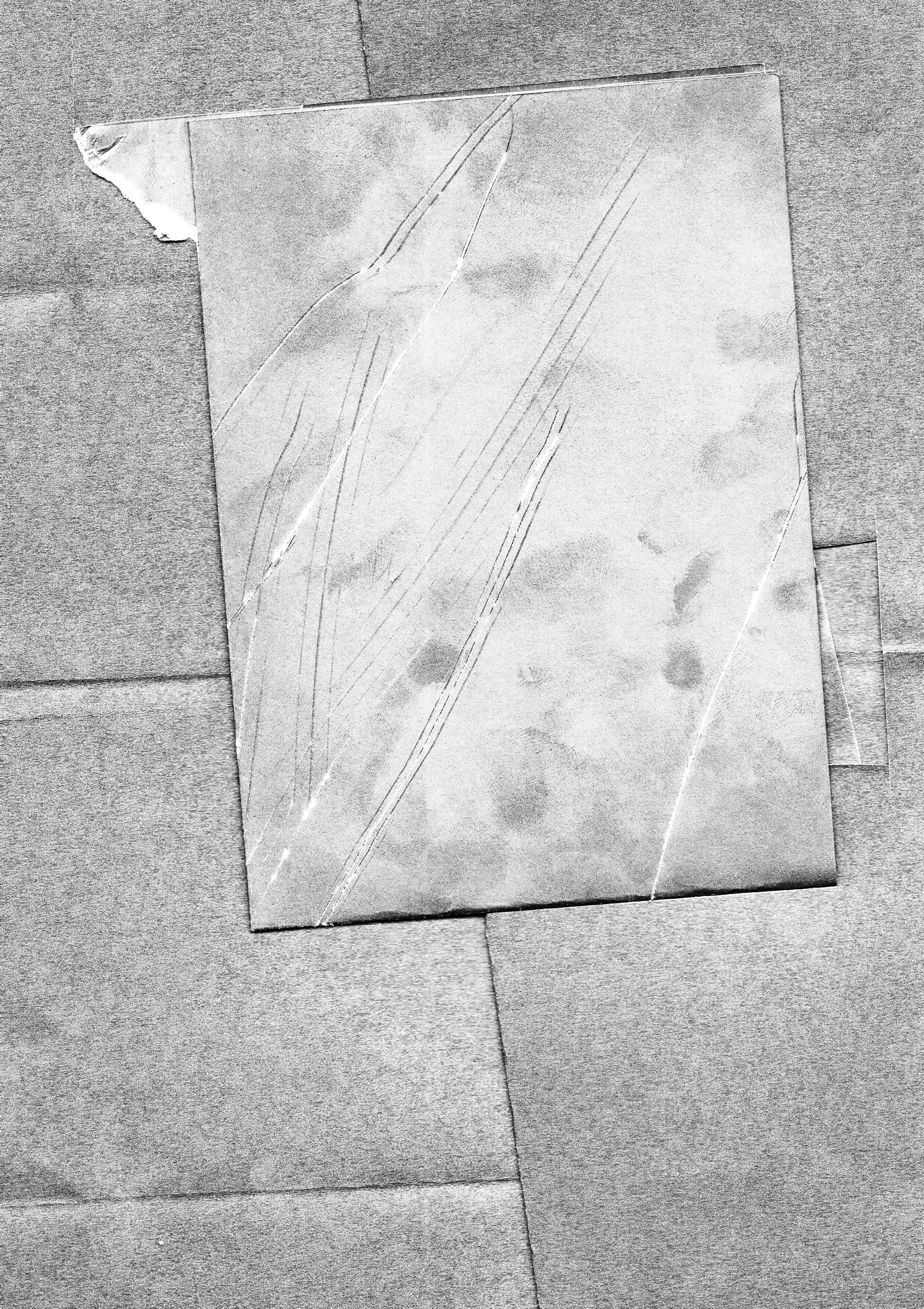

4
Storie S from
Alma
Aman
Angela Hui
Cassius
Catherine Cheyenne
Elena
Estefany
Giulia
Hualing Nieh Engle
Jomar
Luna
Mark
Mia
Michelle Zauner
Min
Mio
Rachel
Rebecca
Simu Liu
Stephanie
Teo
Trevor Noah
Victor
Zaym
Ziyang
t o more people who are battling cultural S tereotype S and S truggling with their own identity
*Ranked in no particular order, based on alphabetical order.
5


Disclaimer:
The content summarised in this project is excerpted from interviews and relevant books for readers. The views expressed solely represent the interviewees’ personal opinions. The public figures summarised from their works only represent my reflections on their statements.
Full names are used for public figures, while interviewees are identified by first name only.
8
This collaborative project comes from 20 in-depth interviews, 5 secondary research, and my own story. Those 26 stories all come from mixed-race and third-culture individuals.
The primary research includes people born between 1983-2005, spanning different generations who offer perspectives on cultural identity and heritage.
The First-person narrative describes the primary research participants while the third-person narrative depicts the public figures. All stories are individually summarised from interviews and literary works.
Many individuals embody both roles, so I did not categorise participants into distinct groups. This mirrors our shared feeling of disliking rigid labels, preferring a fluid sense of self. Thus, I organised alphabetically by first name to share our stories.
These 26 people’s narratives show 98 years changing within 25,000 words.
Our stories explore complexities of cultural identity – how our sense of self relates to diverse cultural influences growing up. We discuss feeling in-between, adapting to new environments yet maintaining ties to our roots. Diverse upbringings foster varied resilience alongside different internal conflicts.
Over time, many forge their own identity outside stereotypical labels. Identity transcends simplistic categorisation, often self-defined through an evolving process, gradually shaping one’s sense of self and place in the world. By sharing our stories, we illuminate the complex factors shaping who we are and where we come from.
I hope this project offers perspective to those navigating their identity while providing insights to open-minded readers without similar experiences.
I hope these 26 stories build a bridge between different kinds of people in the world - reminding us we are all different individuals, no different originally, simply human.
9




I am Portuguese Croatian - my dad is Jewish Portuguese and my mum is Croatian. I was born in Canada but never lived there, as my parents worked for the United Nations, so we moved between Lebanon, North Korea, Italy and Jamaica while growing up.

Moving so much, I felt I was leaving behind the familiar and starting over constantly.
But as a child, I didn’t appreciate that these experiences were nurturing useful skills. I didn’t realise they were shaping me into an innovative, emotionally intelligent thinker able to adapt to fast-paced environments.
My teachers even suggested learning disability checks because my multilayered thinking was deeper than peers’ and I saw things from different angles. This made it hard to communicate in ways others expected. They said I needed to improve my communication.
When writing early on, I would approach assignments uniquely, unlike English speakers raised in Canada or America. Learning five languages, I thought in multiple tongues simultaneously. It was difficult to differentiate between them in writing at that young age. Although this wasn’t an issue when speaking, writing involved consciously deciding which language to convey my thoughts in - a complexity others struggled to grasp.
Even now in undergraduate studies, these challenges remain to some extent. It is both a skill and fear. To ensure understanding, I will carefully think about who I’m speaking with and how we communicate.
I translate my thoughts into terms they will comprehend best. This is a technique honed through my upbringing.
The language skills act like a claim to belonging - if you can speak people’s tongue, you’re accepted on a deeper level than passport grants you.
Although never lived in Portugal or Croatia, my parents had this agreement that my mom would speak to me in
English and my dad would speak to me in Portuguese. But my dad was in a different duty station majority of the time.
If now they sent me to Portugal to take part in family events, I will not be accepted as the rest of the family is, because we couldn’t speak the same language, I couldn’t make the joke with them, and I don’t have the same nostalgia of a country that they do and living there every single day. Only knowing English and languages from school.
Now losing my Arabic being away from Lebanon, I’ve lost that connection too - now just nostalgia for a past home. I know that when I go there, I will be treated as a foreigner and I’ll feel like a foreigner and I won’t feel like I did when I was a kid.
“ i ’ve al S o come to embrace that i ’ll never have the S ame patriotic feeling S for a country that other S do. i don’t have a deeprooted place that i ’m from, S o i could never fight S omeone in S ulting “my country.” i don’t have that inten Se loyalty that make S my friend S pa SS ionately S upport their nation’S team in the w orld c up. t hi S u Sed to S adden me becau Se there’S nowhere i truly call home except where i ’m Sleeping at night.
but now i reali Se home i S ju S t a placeholder - i feel comfortable where i make my own Space.”
When asked about my background, I normally say I’m Portuguese Croatian. This conveys my family structure and multiculturalism without explaining everything repeatedly.
But I adapt my response depending on who I’m speaking with, to feel more familiar to them.
With Spanish speakers, I say I’m Portuguese. With Brazilians, also Portuguese. With Americans, Canadian. Here in Tajikistan, I say Croatian given the Slavic, post-Soviet culture.
So it allows that immediate knowledge from the other person to know that we have somewhat of the same social norms in us, so they’re more comfortable and they will expect that.
So I’m more likely to be invited to things and be more faster in a simulation and better welcomed by the people that I’m talking to. Also, I only share my full
12 Alma 18 year S old
“You have to adapt very quickly - learn fast and almost be a chameleon. You must immediately fit into a new culture seamlessly so you don’t stand out and can have a normal social life.
But when I was young and would meet my parents’ friends, I was a very aware child, like many thirdculture kids. I’d be discussing politics and cultural heritage at eight years old, asking why certain issues existed because I’d seen things so differently in other places while growing up.”
experience once the conversation goes deeper because I don’t want other people to think I am narcissistic.
Although people could understand what multicultural is like and in theory, each different multicultural person will have a very different experience of how that’s played out in their life. So that means that although you’re somewhat similar, it’s like you will only ever be in understanding of each other’s loneliness or lack of belonging.
My family’s history shows the struggles of belonging. My grandfather was a chemist, but when immigrating to Canada could only get labour jobs like forklift driving. After years of studying science, it must have been difficult transitioning to that role. My grandmother worked to support them as well, the lack of support for immigrant families pressured them out of their aspirations.
Growing up in Canada, my mother faced prejudice because her classmates’ parents assumed she was Pakistani because her name. At the time, Canada had negative sentiments towards Pakistanis, so she was often excluded.
When she had my brothers, she chose a more English name so they could better assimilate than with foreign names.
And when I was growing up in Jamaica for my high school, when the black lives matter movement started well, I was the racial minority in terms of actuality, immediately being the only European descent person in the room making me a target.
So saying that I was Canadian was more strategic for me because otherwise,
people that already knew that I was Portuguese would like to call me a colonist and all these other things. I use it to avoid conflict as another layer.
I suppose it’s not solely about our heritage, but rather a matter of not feeling like I belong, and this feeling has persisted for several generations.
tho Se that S tay S tagnant are the thing S that make my home, not S o much the country, but then i al S o in coming to term S with how i embrace it, i S then reali S ing that it’S S uch an a SSet enough for me. i can be S o much better with diplomacy and being and hold le SS bia S in my view.
1 Me at age 5 in front of the United Nations headquarters
2 My Baka (grandmother) and Deda (grandfather).

3 My 6th birthday with my family in Tyre.
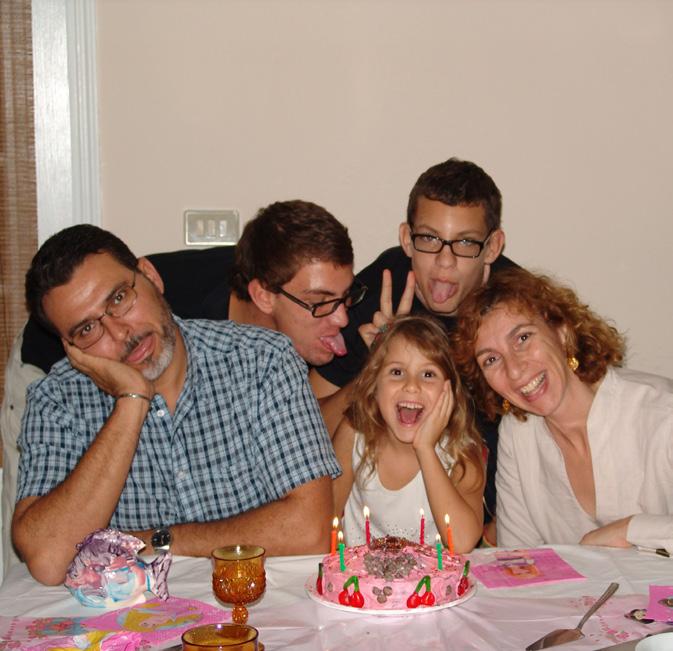
On the far left is my dad. The far righ you see my mom. Behind me are my 2 borthers and infronto fm be the cake my middle brother had made for me .
4 Me an my parents in london as they drop me off for University (2022).

5 A picture from my persepctive as I paint my part on my highschool graduation mural.

13
5 Me and my mom on the great wall when I was 7, 2012
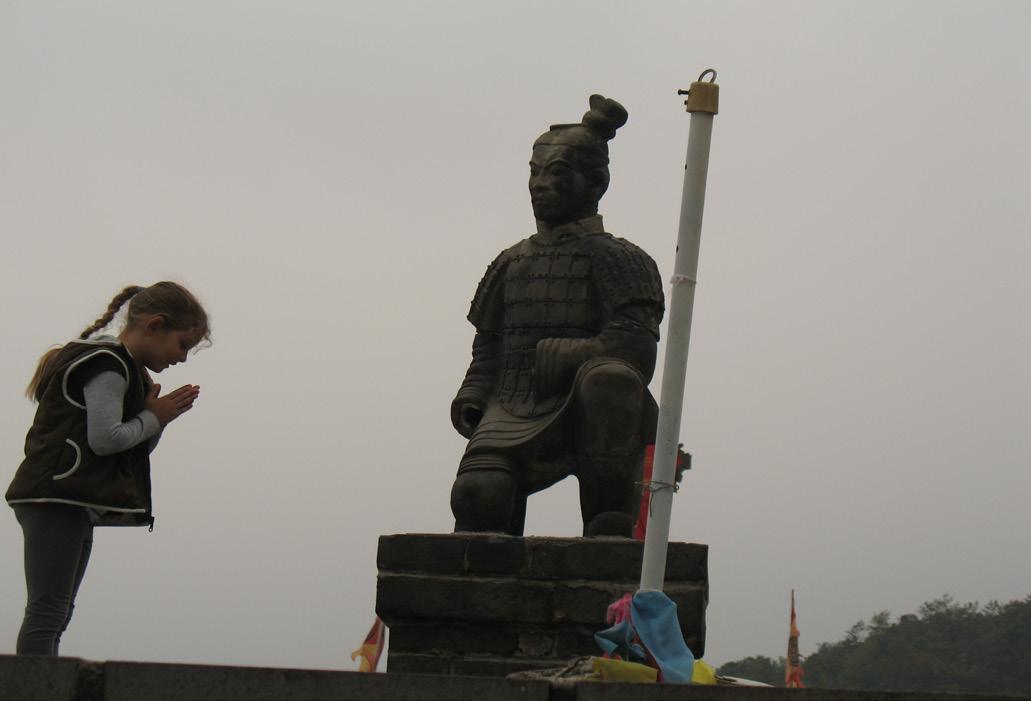
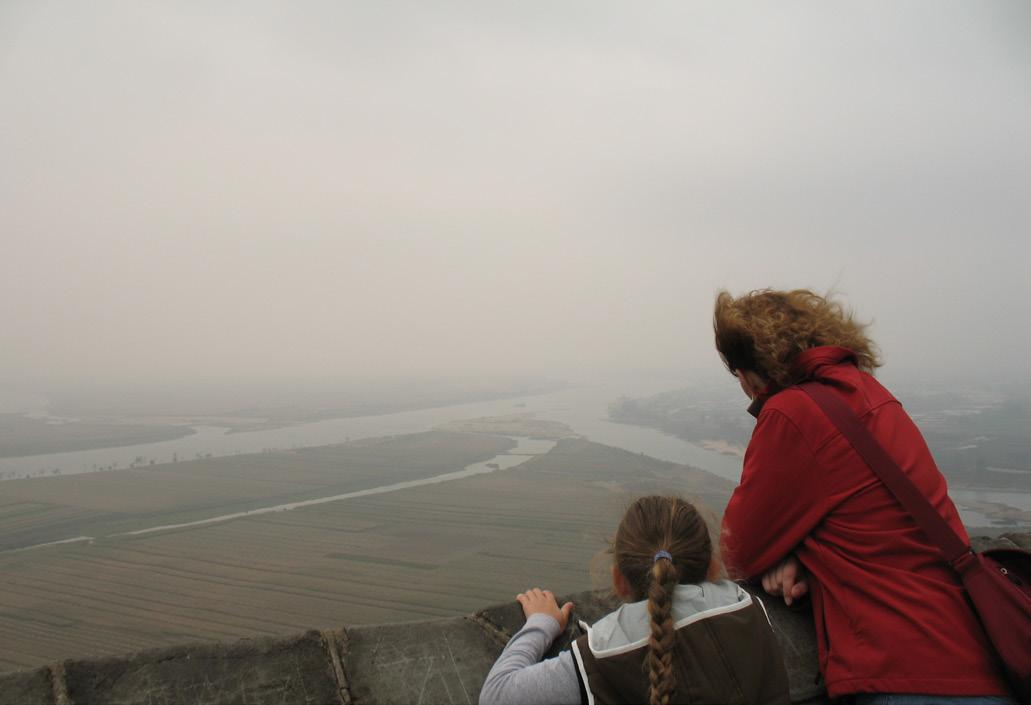
6 My first flight at 9 months old on my move from Canada to Lebanon, 2004

7 Me and my Baka at our house in Canada, 2005

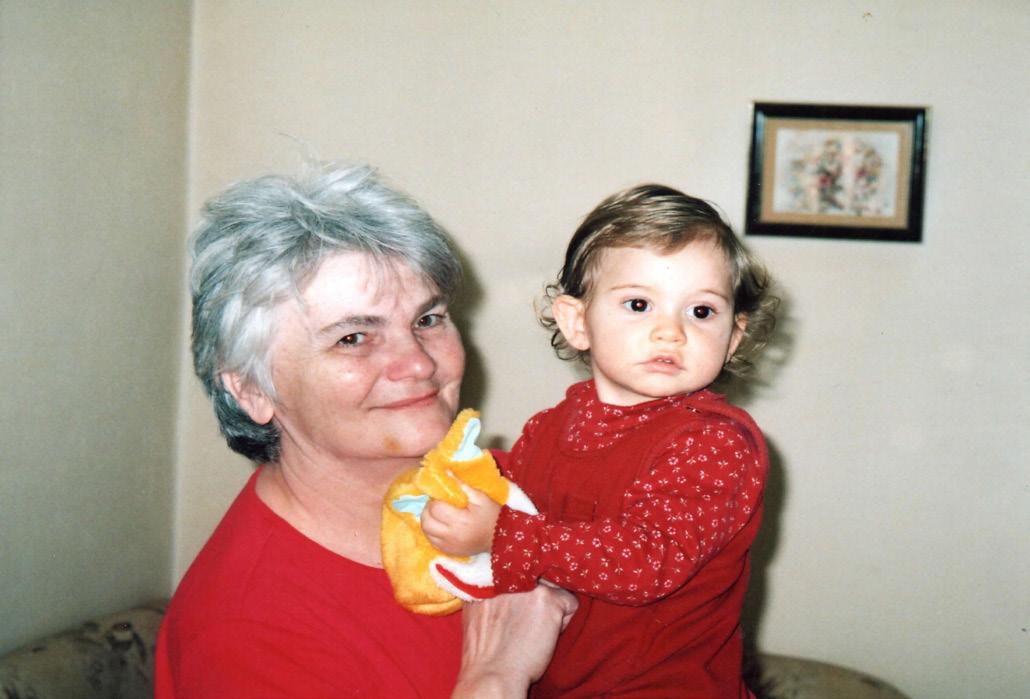
8 My family and I in the forbidden city in China, 2011

9
10
My oldest brother was at school.
14
My mom and me standing infront of chinese side of the Sino–Korean Friendship Bridge.
5 8 9 10 6 7
Me bowing to a kneeling soldier statue on the great wall of China, 2011
11
12
13
14

15




16

15
My brothers and I posing infront of the Korean Airline plane on our way for a trip on Mnt. Chilbo.
My first climate march at 6 years old in DPRK.
Me in grade 1 doing a school performance with my class in Tyre Lebanon.
When you travel a lot you learn how to get comfortable. This was my make shift bed while we traveled to Croatia to see my relatives.
My grade 5 graduation in Beruit Lebanon.
11 14 15 16 12 13
Me and my grandmother standing infront of our house in Portugal, 2021
33 year S old
“ f rom my childhood onward S , i never felt like i belonged anywhere. t hi S continued into early adulthood, where i tried fitting in with variou S group S - people of different culture S , religion S , etc. i con S tantly S truggled to find where i belonged.”
my diverse roots. Now, because of my upbringing, I feel at ease without a defined cultural label. I can relate to anyone. Whereas before I desperately sought belonging, I’m now content without a specific identity. I can openly accept people of all backgrounds without stereotypes or racism.
cultures will be destroyed by interacting. As a multicultural person, I could enjoy everything, which benefits me as a human.
I’m born to an intercaste couple, My mother is Anglo-Indian, a mix of British and Indian, and was raised Christian. And my dad is a pure Indian Muslim. So they were both of different religions. They was rasied and born in different area in India. India is big country which has more than 200 or 500 different kinds of cultures by different areas, and we have officially 28 languages, although I think there might be around 200 to 300 variations of languages. After having me, we moved to an area with yet another new language and culture. I was raised in this blended environment, influenced by various cultures and faiths.
In this huge multicultural country, you often feel the need to belong to a group identity. I felt left out without that anchor.
As a teen, I saw myself as an outsider while exploring my identity. For example when I identify my religion, like I am a Christian or I am a Muslim, I was trying to fit into both, but both of the groups couldn’t really accept me because I am not hundred percent of Christian or Muslim. When I more tagging myself I felt I am different from my friends or other people, I felt I didn’t belong to them not because other people treated me as an outsider, it was more a self-feeling. I put myself in that role.
Fortunately my parents didn’t restrict my exploration. Their guidance allowed me to learn and understand
“ m y name i S derived from a rabic. a man mean S “peace” in a rabic. i t al S o ha S different meaning S in h indi, meaning “love.” So the root S of my fir S t name e SSentially S ignify “peace and love” between the different language meaning S.”
My parents were originally from another part called Kerala and but I grew up I was born and bought up in a place called Karnataka - like mini countries with distinct heritages and languages within southern India. Exposure to different people and media allowed me to pick up various languages as a child.
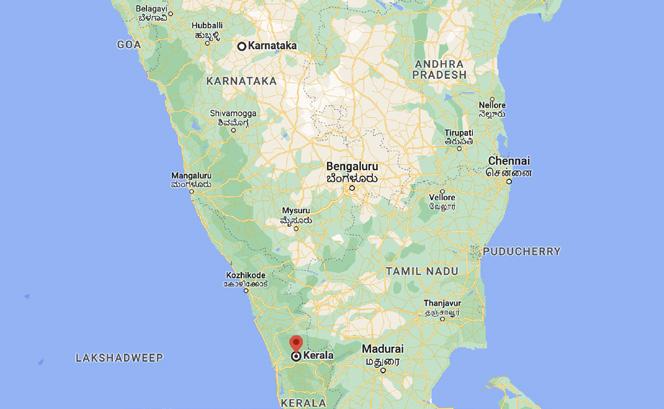

I currently speak five languages, four of which are Indian. Using local languages makes it easier to communicate with people and understand the culture built on that language and food. Conversations about Indian cuisine spark some people’s interest in trying it, leading to broader talks about culture. I hope to someday showcase the differences between southern and northern Indian food since most Indian restaurants in the U.K. feature northern dishes. Introducing more regional variety could give people a fuller experience of India’s diversity.
But to be honest, people seem less open to cultural mingling than in my childhood. Nowadays people appear more concerned about preserving identity. As a child, I felt people happily interacted across cultures. A gift of my upbringing was experiencing it all through my parents’ open-mindedness. We shouldn’t fear change or worry that
“ y ou don’t need to focu S on having your own cultural identity. t he mo S t important thing i S being a good per S on and treating other S well, regardle SS of culture. at the end of the day, you’re a human being and S o i S the other per S on.
t hat’S how you Should treat everybody, no matter what. f or that, you need to work on your Self and eliminate prejudice S rooted in culture.
t he i SS ue i S mo S t culture S define an “enemy” culture a S their oppo S ite. w hen you align with one culture, it automatically make S the other into opponent S or enemie S. t hi S happen S in i ndia - you’re born into one group, and ju S t becau Se of that, the other group become S your enemy. i t doe S n’t make Sen Se to me.”
16
Aman
1 My family and I dressed in our traditional attire for the Onam festival.
1 2
2 The map of Southern India. (©Google Map)
Angela Hui
*The content in this article is summarised and excerpted from interviews and relevant books and presented for the readers. The views expressed in the text solely represent the personal opinions of the interviewees. *文中內容是作者經採訪和相關書籍摘錄,以饗讀者。 以下內容僅代表受訪者的個人觀點。
“Many immigrant communities are reluctant to report any crime. Always better to take it upon ourselves to resolve whatever the issue is, because the police never believe us and we don’t want to kick up a fuss or rely on others. We’re taught not to speak out, not to rock the boat, keep our heads down and to fit in for fear of attracting unwanted attention on ourselves and our family. For my parents, silence is a form of protection, and dealing with matters on our own means safety. The see the mistreatment as the price of doing business and just another obstacle they have to overcome.”
Angela is the child of first-generation immigrant parents, existing in an in-between space: the inherent crisis of being not Chinese enough or British enough. She grew up at a Chinese takeaway called Lucky Star in Beddau, a village in South Wales valley. From childhood to early adulthood, this restaurant was the centre of their universe, business and personal overlappingit was both the takeaway and her home. Business conflicted with family. Homework was squeezed between precious customer serving time, and she and her two brothers were not spared from chipping in to help with chores, answering phones, taking orders, packing boxes. Growing up a minority in Wales meant being an anomaly in Hong Kong too, meaning she didn’t fit in anywhere fully. She found it difficult to connect to her culture because in Beddau, there were not many faces like hers. She was often told to “go back to your own country” or kids would mock her saying “your parents use dog meat in their special fried rice” and pulled their eyes slanted. Yet whenever she went back to Hong Kong, may have looked like everyone else on the outside but stood out starkly. She called herself a banana - derogatory for looking yellow on the outside but white inside.
“ w hile tradition retain S it S iron grip over e a S t aS ian familie S , like mine, family dynamic S are no longer a S black and white in the face of modernity. f or year S i have been on a treadmill of validation and vanity, trying to pick and choo Se which lane Serve S me be S t. aS i Slow down, ba Sking in thi S moment, everything Seem S to click into place. w hy pick, why not both?”
From the way she spoke, dressed and carried herself, Hong Kongers could spot from a mile off that she wasn’t one of them. Her parents had immigrated to the UK from Hong Kong in the 80s to start a family and seek better quality of life. With little education, their only options were low-skilled physical labour like cleaning or running corner shops, fish and chip shops, takeaways and restaurants. Many immigrants of the time worked hard, sacrificing their own livelihoods to give their kids the best possible life, sparing the next generation their hardships. Her parents also do not have enough English skills, and she and her two brothers often had to act as their translators. She also couldn’t understand entirely Cantonese, undoubtedly presenting some identity comprehension obstacles. She wrote a memoir during the pandemic when hate crimes against East and Southeast Asians had risen 179%. “All my life I’ve hated being East Asian, especially a Chinese takeaway kid, but how does a person learn to hate something they were born into?” Hui writes. Her book was named Book of the Week by BBC Radio 4 and Book of the Year by The Guardian.
1 Angela and her book. (©Angela Hui)

2 Angela and her parents outside Lucky Star. (©Angela Hui)

3 Lucky Star Takeaway counter decor. (©Angela Hui)

17
1 2 3
32 year S old
I am racially identified as Black, but have a mixed Caucasian and Jamaican family background. On my mum’s side, her family is from the Forest of Dean just below the Welsh border. My dad’s parents immigrated from Jamaica at some point. I don’t have a strong relationship with my Jamaican family due to my father’s absence and abuse, leading to negative experiences for me. I rarely saw him and cut off contact around age 13, only re-establishing it in my mid-20s, so I had relatively little contact with my Jamaican family while living primarily in white English communities.
I still vividly remember when I was about 7 attending a funeral with my dad. At that age, the unfamiliar Jamaican cultural setting provoked my anxiety, not knowing the expectations and norms. My neurodivergence compounded this. I did one thing violating their basic norms, then my father told others when I still there, “It’s okay, he’s white” as the explanation that I didn’t understand the context, implying I wasn’t one of them. He used “white” to characterize outsiders.
Comparing my childhood to adulthood, people treat me differently, though it’s hard to isolate these changes from moving through different spaces. My self-perception and how others see me have transformed significantly.
In childhood and adolescence, I lacked strong racial/cultural self-consciousness, though in hindsight I can see how they shaped my experiences. Growing up in a predominantly white British community contributed to this lack of awareness. With limited concepts of race themselves, people couldn’t provide a shared perspective on racism.
As we mature, we gain words and concepts to articulate experiences that previously stayed unspoken, potentially significantly impacting our self-understanding. Discussing such experiences is difficult without the language to fully express them. Gaining awareness involves having a community who shares those experiences, whether racial, gendered or otherwise.
Race is a social construct based on how society interprets physical features like skin and hair. Its socio-biopolitical history shapes racial categories in particular ways. As a result, my racialization shifts across contexts, not always aligning with being labelled Black.
You can see in this process with my dad calling me “white” as a child that he was policing the boundaries of who was part of a particular group. But it also showed my genuine unfamiliarity with that cultural context. These categories of white, and black don’t just refer to skin colour but to personality, culture, ethics - many aspects.
There’s a saying in philosophy that “the map is not the territory.” Categories, concepts and taxonomies help us relate to the world in certain ways, like a map simplifying details to aid navigation. But in that abstraction, there are always embedded values, politics, and assumptions - it’s never neutral. It doesn’t perfectly reflect just
I’ve mostly lived in majority white spaces and actually feel more naturally comfortable there. In different spaces, I probably feel similarly to how a white person might - not alienated, but unsure where I stand as people read me very differently. I exist where these categories break down. My experience relates a lot to how queer people describe their identities. So those two different identities’ assumptions also help me a lot to navigate my subjective understanding of this world.
I used to love acting and drama, dreaming of becoming an actor. However, I felt disheartened when I realised that many of the roles I aspired to play were limited to white characters. This socially and historically constructed taxonomy had ingrained itself in my mind, making me feel restricted. Then, I came across the TV show “Luther,” featuring Idris Elba as the lead character. He portrayed a smart London cop, and what struck me was how his blackness didn’t define his role. It resonated with me deeply, as I had always felt disconnected from those actors that focused solely on a character’s blackness, which reminded me of my father’s actions from my past.
At university I was often the only black student around. I’ve been singled out as smart and intelligent, which I dislike - it implies most black people aren’t. As the token smart black person, my intelligence became racialized - the exception to blackness. This contributed to social isolation growing up, leading me to over-identify with academic achievement for self-worth and ego, though it was fragile and stifling. This made me hesitant to explore new things and collaborate with others, hindering my learning process. However,

18 CASSIUS 28 y ear S old
one
reality.
1 1
to
“Sometimes people would say, ‘It’s a real shame you don’t have a connection to your Jamaican heritage’ when I would try and explain the relationship with my father. And I would get quite angry when people dismissed it. I coined this phrase when young - culture comes through the air you breathe, not the blood in your veins.”
Idris Elba in ‘Luther’ Copyright belongs
its production company.
as I’ve grown older, I’ve come to appreciate the beauty of humbly recognizing areas where I lack knowledge and learning from others.


I have a background in cognitive science, informatics, and machine learning. Now I’m more interested in social sciences. I’ve noticed that some of the top figures, like leading AI scholars in my field, are individuals with diverse backgrounds, including those of non-white heritage. This realisation holds great significance for me.

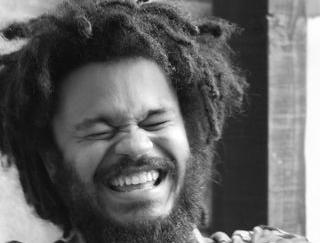
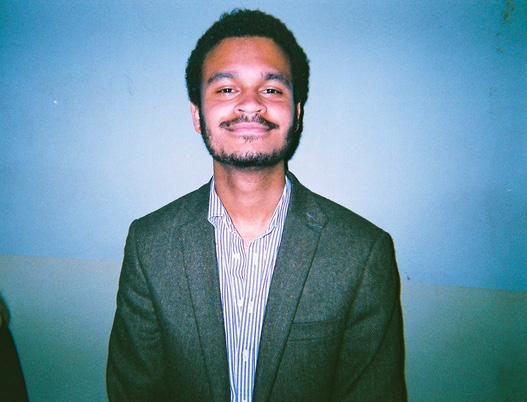



19
“I didn’t fit the stereotype in how I spoke. People would often say, “You’re the poshest black person I know,” because I speak with a middle-class English register. I didn’t see many black Nobel Prize scientists, which meant that racially, there was something in my racial essence that limited my potential for achievement.”
2
“ g rowing up with my n igerian S urname, people a SS umed it wa S my name when i wa S a child, even if they que S tioned it. but a S i got older, people S tarted to a SS ume i mu S t be married to a n igerian man, like the n igerian name belonged to S omeone el Se. i found that more fru S trating. So when i met my hu Sband and had the choice to take hi S briti Sh S urname, i opted for that becau Se it make S life ea S ier, really.”
My grandfather is Nigerian, though it’s a couple of generations back that he moved from Nigeria to the UK. He married my grandmother who was a white British woman, and then my dad married a white British woman too. My grandad was black, African and Nigerian - he was my only grandfather, my only reference point generationally in that sense.

A lot of people were moving to the UK from South Africa at that time, but when my grandad moved here, Nigeria was part of the Commonwealth so he had a British passport. All of my family were born in this country apart from my grandfather. The rest of my family are white British and very focused around Yorkshire, so people don’t assume I’m anything other than white British most of the time.

So generally I’m a person with an invisible dual heritage. But growing up, I had a Nigerian surname which led to a lot of questions, because I think the assumption was always “How does someone who looks like you have a name like that?”
At that time I didn’t get any guidance or support with those situations, but in recent years I can go online and find resources and people sharing their experiences. As a child there definitely wasn’t the sharing, acceptance and platforms to discuss these things that there
are now. I also always like seeing mixed ethnicity families represented in TV and film - it was never shown when I was growing up, so it’s nice now. There are a few actors and people with a similar background, who have a black grandparent, and I quite like reading their interviews to get a sense of how they navigate this.
I watched a film recently with a black or mixed race man reading to his white appearing daughter, which was really nice because it reminded me of myself and my grandad. People would take for granted a grandfather figure as some white man with a big white beard, but my grandad was a black man. Seeing that reflected feels significant to me. It’s definitely a positive thing.
The world tends to be quite a mono-racial place. And if you are mixed race, I think there’s a certain amount you’ve got to accept - that you’re always going to be viewed a bit differently through that monoracial lens. I feel like I’ve spent quite a lot of years battling against that, looking for acceptance and understanding. But actually, even though we probably don’t necessarily want to be educators all the time, we have to be the ones who share our stories and do that education. We can’t wait to be given permission - we’ve got to find and claim our own place.
20
Catherine 1 2
1 My grandma and grandad, 1970s
My mum, from Barnsley with my dad. 1970s
40 year S old
“ t here’S a perception that mixed race ju S t mean S you look like one of your parent S. p eople Seem to think that’S ea S y to under S tand. but that’S not the full picture at all. t here are different culture S worldwide, S o you can’t S ay mixed race look S one particular way. e ven people who did look like my dad - black and white mixed race - have children, and tho Se children may have familie S with people from other ethnicitie S. So you can’t engage with mixed-race identitie S without accepting that we all look different. m aybe that feel S like a new thing in the la S t 20 year S. but obviou Sly, that’S not true nowaday S - all throughout hi S tory, and certainly within the la S t few generation S , it’S been happening. p eople’S thinking need S to catch up to tho Se new generation S.”
I only found out at my grandma’s funeral that she had actually given all her children Nigerian names - so my dad had a Nigerian name and a British name, but he never told me that. My dad was born in 1955. Thinking about how attitudes to black and white couples were even more positive recently, back in 1955 it was really unheard of. I feel my dad was part of one of those new generations having to navigate a mixed race identity without any other role models, research or cultural figures to look to. So I think it was really difficult for him. For those reasons I think he found it hard to connect with his heritage.When I was young, my dad tried using Nigerian food to connect with his roots - we had some African soup once but we thought it tasted so bad we never had it again. But I do feel bad because as a child I don’t appreciate that my dad was making an effort.
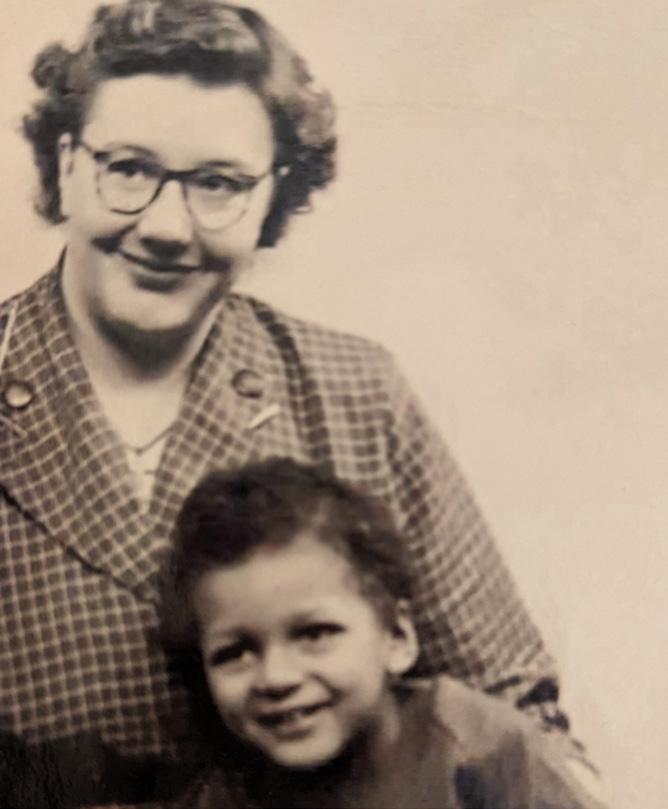
Now it’s my turn, I’ve found I’m very curious to learn some Nigerian language and phrases using apps. The technology available now means you can learn about your ancestors’ culture in a way you never could before, which is amazing. It’s nice to be able to say a few words in the language of your ancestors.
I’ve also got two children of my own, and I want to pass on what I can, because they’ll probably have the same identity questions I did, even more so another generation removed.
My kids recently had to research a particular country’s culture for school. They had to look into the food, language and other aspects. Each child had a table, and the whole class would go around to every table as the kids presented on their chosen country.
They could pick any country they wanted. It was really nice because my son picked Nigeria, and I was so proud he felt able to talk about that part of his identity.

I think it’s important schools give children that opportunity without any judgement or questioning why they chose that country. It teaches really valuable skills.
The school does a wonderful job of just learning about different cultures, not labelling or categorising people.
5
3 Me and my dad in our garden in Sheffield maybe 1989?

4 My dad with the next generation, my two sons.
5 My grandmother Kathleen Jessop, from Sheffield for many generations and my dad as a toddler, taken around 1958.
21
3 4
6 My grandfather Warrian Obodo, second from the right with his friends in Sheffield 1950s. They were all enterprising young men starting new lives in the UK from Nigeria and many remained lifelong friends. One became a famous nightclub owner in Sheffield and it’s special to trace my family story along the growth in Black British culture from the 1950s to present day.

7 My grandma and grandad at the pub, 1980s.


8 Me, my dad and my boys in Sheffield, 2017

9 Me and my cousin Simone, 1990s. Her mum is my dad’s youngest sister Margaret who married a man with an Afro-carribean background. They live in Birmingham.

22
6 9 10 7 8
10 My grandparents, 2000s
11 Family gathering. One of my favourite photos, we didn’t all get together very often . This photo has my uncle and my mum in the front. Behind (r-l) is my aunty Maureen, my grandad, my aunty margaret and to the left my uncle ernie who is Maureen’s husband. Ernie has Italian roots, adding another branch of culture to my wider family. I’m guessing around 1980s.
12 Me and my brother with my grandad, 2004
13 My mums family, 1990s. My mum was one of 11 so I have a LOT of cousins! Me and my brother are the only ones with a mixed background and we’ve never felt anything but part of the family. My dad was the first ‘black’ person my grandparents had met, but they were so welcoming. I’ve always felt proud to come from families so accepting of difference.


14 Christmas 1990s. My grandma and grandad in their house, me and my brother really happy with our gifts. We went to their house every boxing day.

15 My husband James, with me and our boys in London. 2022


23
11 12 13 14 15
CHEYENNE

33 year S old
to an S wer “ n ew c aledonia”, and then explain where it wa S and what it wa S.”
But outside the Pacific, when I arrived in Scotland for example, my first answer is generally that I come from very far away. And second that I’m French, from an island off Australia.
“
n ew c aledonia wa S already not that well known, even unknown to the average au S tralian.
i t wa S n’t well known becau Se the fir S t place i moved to when i left n ew c aledonia wa S
au S tralia. w hen i wa S S tudying there , white au S tralian S e Specially didn’t know where n ew c aledonia wa S or what it wa S r ather, people from other place S , like el Sewhere in the pacific, knew where n ew

c aledonia wa S - for example immigrant S in au S tralia and n ew Zealand, or people from f iji and other pacific i Sland S.
but white au S tralian S generally didn’t, unle SS they had been there on a crui Se S topover. f rom the moment i left n ew c aledonia, whenever S omeone a Sked where i wa S from, i ’d have
I’m basically an indigenous person from New Caledonia. So my cultural heritage is very much that part of very native, but also because we’re still very much French and we have administratively we’re still French and our school system is French. We speak French.

That was basically my experience growing up, except when I lived in Vanuatu after finishing my bachelor’s degree. When I lived in Vanuatu, everyone knew what New Caledonia was because before colonisation, New Caledonia and Vanuatu were very linked culturally. So people there knew of those links even though colonisation severed them. When asked where I was from, they would usually first guess Fiji, then ask if I spoke French when I said New Caledonia. Even though we are still very much French there.
So there is a thread in how I answer that question. In the Pacific I would just say I’m from New Caledonia and expand on it being close by or French depending on people’s reactions.

My grandfather on my father’s side is French. So there was already a multicultural divide in my family - half of my family, or two thirds, are native, and the other third is very French. When my grandparents got married in the early 1960s, the priest would only officiate the wedding after 10pm, when everyone had gone home, because he didn’t want to marry a white man and a black woman officially. So growing up with both native cultural background and a lot of French cultural history, as well as the heavy history of colonisation in New Caledonia, brought a lot of challenges in learning to navigate how people related to each other there.
So my mother tongue is actually French now. Oddly, it’s my mother tongue because it’s the one I retained - before starting kindergarten I only spoke my parents’ native languages, but when French was introduced in school I lost most of those and only spoke French. I didn’t start picking up
24
1 3 2 4
my native languages again until middle school. But I have a French accent when I speak.
In New Caledonia we have a very weird mix of underlying heritagewe’ve picked up a lot from French culture, like cuisine and habits. You won’t find a person in New Caledonia without wine and baguettes in their kitchen - those staples brought by the French stayed.
But we’re also influenced by our geographic situation, close to Englishspeaking countries but also Southeast Asia. So staples in most households include wine, bread, rice and noodles. It took me a while when away from home to get used to not having bread or rice at every meal.
We use a lot of things well in our cooking, which comes from the pre-colonisation native culture that we try to keep. It’s not just food but habits and culture too. There are things unique to New Caledonia I can’t find elsewhere that I have to get sent from home, even just snacks, spices and candies that are part of the culture I grew up in.
“ i don’t have any accent when i Speak f rench, becau Se my grandad and mo S t of my dad’S family are teacher S - f rench teacher S So i learned from a very early age to Speak properly, pronounce word S correctly, and u Se proper grammar and Sentence S i had a very nerdy background in that Sen Se. but it al S o meant that for a lot of people, if they hadn’t heard me Speak, even back home, they wouldn’t believe i wa S actually a native. f or example, even S ome of the S ignificant other S of my cou Sin S , if they’d only heard me Speak f rench on the phone to my cou S in and thing S like that. a nd then the fir S t time we met in per S on, they’d immediately S ay:“o h wait, you’re not white!”
New Caledonia (©Google Map)

1 Port Vila - New Year day at the beach because its too hot for anything else.

2 1997 - on my mother’s family’s tribal lands.
3 Maré, New Caledonia.
4 Mom’s grandparents hut on tribal land.
5 Phare Amédé.
6 Noumea - Port Moselle.

7 Something from home ends up on my walls wherever I go.

8 Phare Amede

25
5 6 7 8
10
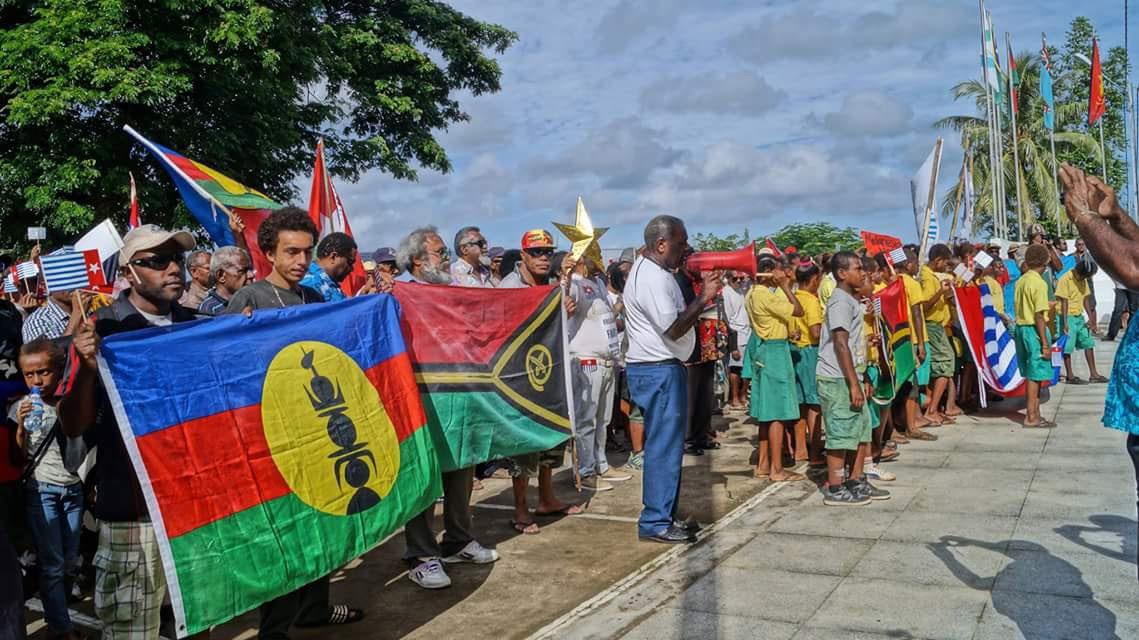

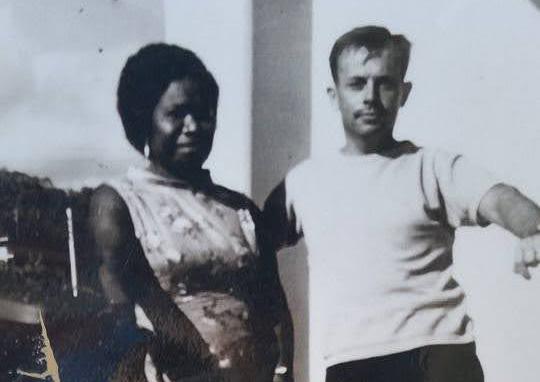
11
12
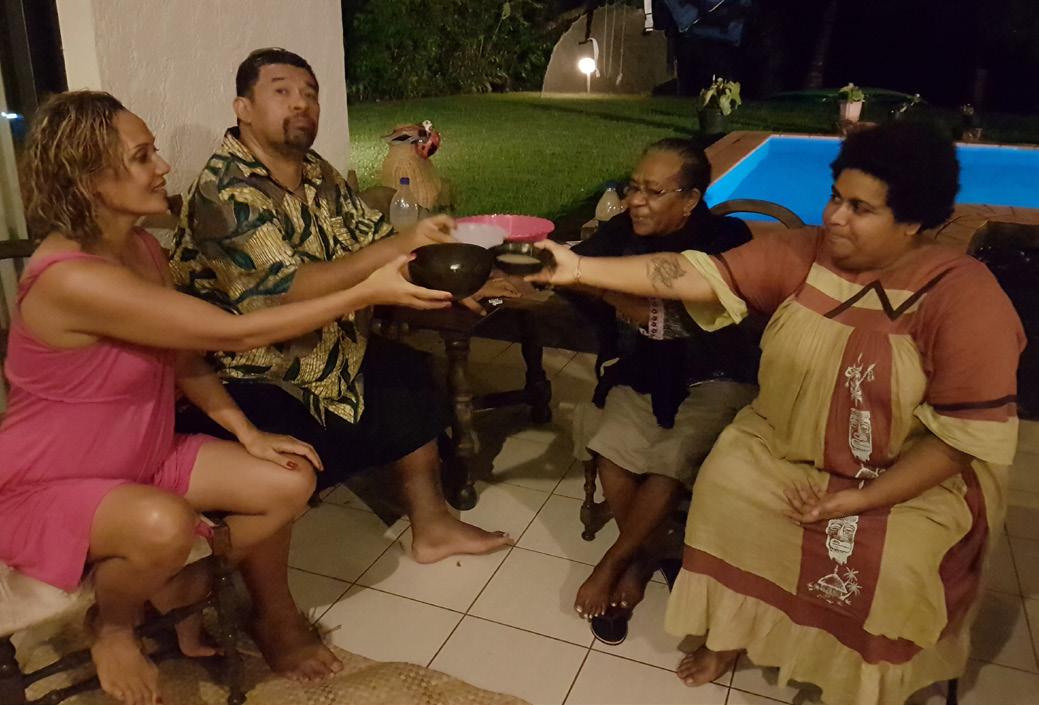
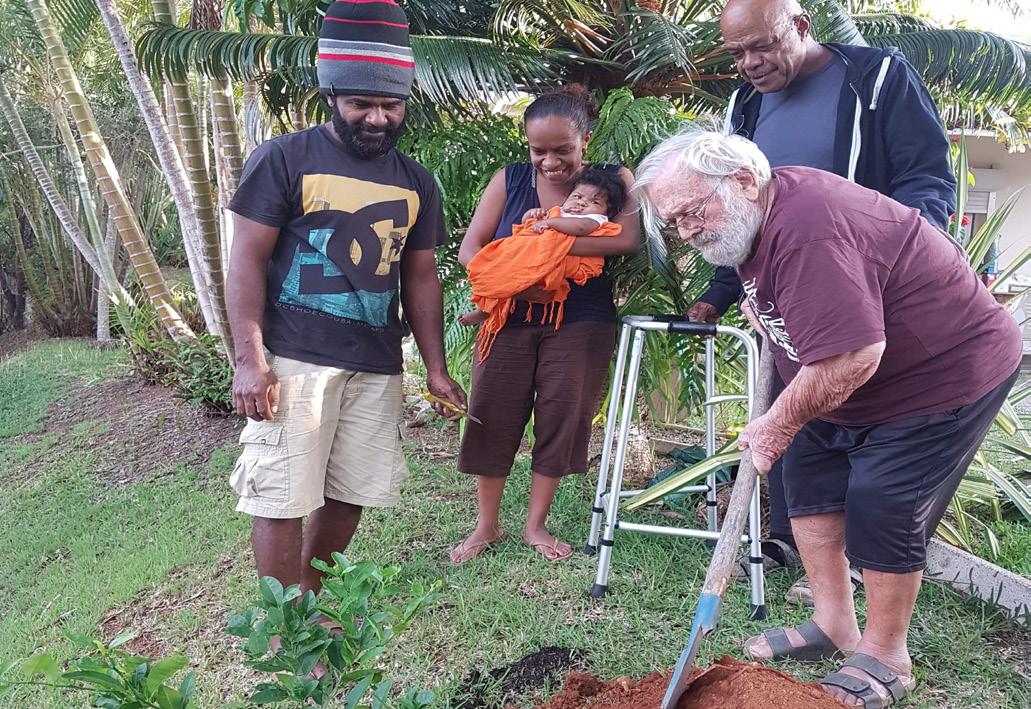


26 9 13 10 14 11 12 15
9 Dad’s parent. Grandma was indigenous Kanak and Grandad is full French expat.
Visit of the Cultural Centre Jean Marie Tjibaou - Mom, Cousin, Grandfather and I.
Drinking Kava (traditional drink) with Tongan and Fijian friends (and mom).
Aunt, Mom, colleague and I, drinking Kava - Port Vila, Vanuatu.
13 Family friends excursio with Mom and I.
14 Grandfather planting a tree for his 6rth grandchild.
15 West Papua candidacy to Melanesian Spearhead Group brough to the MSG Secretariat.
I was born in Romania, from Romanian parents, and moved to the UK when I was 22. The way I respond to “Where are you from?” has changed significantly since I first moved here. I used to be quite naive and openly share where I was born - a country that unfortunately doesn’t have a very positive image these days. As I went through university and entered the workplace, I became more aware of how I am perceived.
I felt those around me did not welcome me warmly. They expected, in simple terms, for me to be a “black sheep” who would do something wrong, based on stereotypes about my home country. This is a shame.
So nowadays, how do I answer that question? I went through a phase of avoidance, saying I was born on the continent rather than being straightforward.
But now, as I have gained confidence in my professional status through studying and working hard, I feel I have shown I am not a “bad” person. This gives me the credibility to just state where I am from.
Does my answer change depending on the situation? If I feel I am in a friendly setting, I find it easier to share my origins. In environments where the question seems to come out of nowhere, I still feel guarded and tense, but I do still answer honestly.
When younger and first moving abroad, you’re braver because you don’t know better. The challenge comes when you start perceiving how others interact with you. The “real world” differs greatly from the university bubble and comes with loneliness you don’t anticipate.
As I said, I now feel self-defended in my identity, which is what saddens me most - that people’s first question is often “Where are you from?” rather than something like “What interests you about this sport?” when I try to join a club. I expect interest in me as an individual, not assumptions based on my background.
I went through a time when I retracted, when I avoided interacting when I didn’t want to be in those social circumstances. There used to be a time when I used to joke and say, I bet you someone will ask me what I’m from at this event, nobody is gonna focus on my research or my project or what I did. The first question would be, where are you from? Was all I want to talk about was of the amazing things that I had done. I wanted to share that because I thought that was successful.
These experiences taught me people likely do not have positive expectations of me. But gaining confidence through my professional and personal growth has better equipped me to
tackle the “where are you from” question head-on. I am different and will forever be seen as different - but that is okay.
“i’m actually not S tupid - i ’m quite clever when Speaking another language. but a S you go through life, i only S tudied here in the uk . i f you a Sked me to tran Slate my work or S tudie S into r omanian, my family’S language, i would S truggle. i tend to S witch back to e ngli Sh. So in expre SS ing my Self generally, i ’ve noticed recently that i ’m lo S ing the ability to fully convey what i want in r omanian, S ince i don’t u Se it often - only with my immediate family.”
The way I use the language is still for me, still a tool to come across, a tool to express myself. Whilst with the Romanian language, it’s very different. I am able to use words that maybe are very unique for that space. They cannot be translated or maybe a few words that we use in English, we only translate them in a word in Romanian or there are, as I said, there are some words that actually are so full of meaning and they are only specific for that place. English isn’t my native tongue, so I see it more as a tool to connect, build bridges, and make impressions. When I use this language, my thoughts go quickly and think how am I gonna translate it.
I find it hard to express myself in Romanian because I cannot find the words. I do not remember how to say certain things, because they would not be everyday words, they would be unique words, and I would find it hard to remember how do I say that. And I would stop and I will take a deep breath in, and I will stop and think.
I always when I get stuck like this and I’m not able to say things in Romanian, is more often with my brother who just talk very fast and challenge and we’re debating about something. And I would not be able to keep up and I would stop that would say I am losting some languages now. and he would laugh and he will slow down. But it is definitely I am losing myself. I think that what I’m losing is that part that allows me to say those nice things in another language.
27 ELENA 39 year S old
I don’t want to feel ashamed of where I’m from. I want to believe I actually bring many benefits. Being born in one country yet only living as an adult in another gives great adaptability and resilience - it makes me more flexible and creative individually. I see that in my daily life; I adapt to circumstances quicker because I had to learn how.
Obviously there is nothing to be ashamed of. As you said, people have certain images about countries and individuals, but we aren’t all the same. I may behave like people here, but when I speak with an accent, I’m clearly different and not fully accepted. The same happens when I’m in Romania. So to me, belonging means being accepted. When that acceptance doesn’t come easily, I feel I don’t fully belong anywhere.
I’ve been stuck between these two worlds, like each has half of me and I’m constantly seeking the other half and a space that feels whole. This feeling is like wanting coffee but not knowing where the machine is - it’s just a different setup that I have to relearn.
“ i believe that when looking at out S ider S - people who don’t belong to our village - the fir S t priority Should be en S uring the out S ider you welcome in won’t harm your community. but after that initial caution, you Should welcome them. i n my ca Se, even after many year S of feeling out S ide the village and S till not fully belonging anywhere, i keep waiting and hoping. i may be clo Ser now, peering in the window, but i ’m not yet in S ide.
i ’m in between two village S , continually trying to under S tand my identity and where i belong.”
What hurts is how people perceive me at face value. Like that diamond covered in mud, I know underneath there is the value I want others to see.
The negativity is just surface-level dirt; not everyone or everything represents the bad parts that may have occurred.”
28
“I think deep down it’s like having a diamond ring while doing muddy gardening work - you know its inherent value, despite appearances. That’s how I feel about my cultural background.
It brings so much - poetry, intense emotions typical of Romanians who’ve had to be flexible across empires. It brings drive and commitment, as Romania has persevered through harsh times to improve itself.
31 year S old
I was born and grew up in Venezuela. My dad moved to the country when he was nineteen, which is quite complicated. I hold a Portuguese passport but would say I’m from Venezuela. I have to explain this over and over, as it easily confuses people. For example, when I told my Scottish boyfriend’s family, they sometimes assumed I was from Brazil or Colombia since I mainly speak Spanish and some Portuguese. People base assumptions about where I’m from on the languages I know.


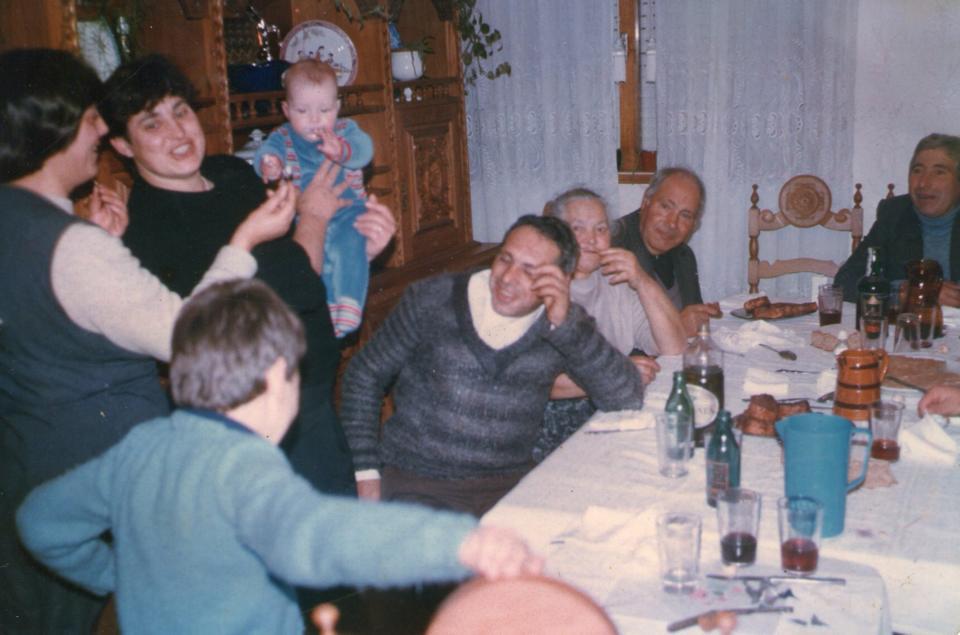
The time I spent in Venezuela gave me a great sense of humour and open-mindedness. Many multicultural backgrounds mixed there - half Portuguese, half Spanish, half Italian - very common. Venezuelans make jokes but appropriately, so you don’t feel uncomfortable. When I moved to Scotland, I kept this same outlook. I knew my name had alternate spellings and pronunciations here, so at first, I just let people say my name however they wanted. But I changed this after someone made offensive jokes about it. Since then, I ask people to call me Steph instead of Estefany.

Having changed countries several times - from Venezuela to Spain and Portugal, and now Scotland - I feel disconnected from many things, both Venezuelan and Portuguese.
To our Portuguese family, we’re the foreigners, the Venezuelans. I also felt this back when living in Spain with some of my sisters, many things there resonated with me. Now in Scotland with my partner, my heart is here too. I’m a mix of all these places - I don’t need to choose just one. These varied experiences shape who I am today. And because of them, I can speak different
languages and navigate the cultures.
I like exploring fusion projects out of curiosity - like friends mixing flamenco with bossa nova - blending Spanish, Latin, and Brazilian heritage. When I explore these cross-cultural things, I feel supported. This fusion shows in the food our family eats too. I was never a huge fan of typical Venezuelan Christmas dinners - we tend to have more Portuguese-style meals. This just feels normal to mesome dishes take me back to Venezuela, others to Portugal or Spain.
“ i ’m S till figuring out what it mean S to belong. i n general, i think people with mixed background S like me will alway S have a Sen Se of exploring and trying to find where we fit in the world.”
I know how to speak Portuguese but it’s true I procrastinated properly learning and getting deeper into it. I’m not great at writing Portuguese since I never learned grammar - only speaking, listening, and reading it during summer holidays with my Portuguese family.
My dad moved to Venezuela at nineteen and never spoke Portuguese with me. It was easier for him to just speak the language I already knew rather than teach me Portuguese. But once he bought me a record of Portuguese-Canadian artist Nelly Furtado when she was first getting famous. Now I still remember the lyrics to “I’m Like a Bird” - it was interesting to hear some songs in Portuguese.
29
“My background is split between Venezuela, where I was born and raised, and Portugal, where my dad was from. I don’t feel fully connected to some aspects of Venezuelan culture and people, but I also don’t feel connected to the Portuguese side either”
ESTEFANY
1 3 2 4
1 Portuguese family.
2 Portuguese family visiting Venezuela.
3 Parents, sister and cousins.
4 Cousins harvesting in Portugal.
I have so many questions for my late father that I’ll now never get to ask. I want to ask my dad about navigating migration because I feel like I’m reliving his history in Scotland.

My own migration makes me feel closer to him. I think my dad was a brave person. He had to learn how to interact with and get involved in a new community. He came to a new country and learned a new language, even though he was already 19. Those two languages have similarities but it was still very difficult. He never properly learned how to write. I remember having to help my dad write letters to the council because he thinks he will write a mix of Portuguese and Spanish.
I feel he likely had ongoing feelings of missing home, making me wonder if he ever felt out of place like I sometimes do here.
But they taught me important things - to expand my mind. They and those experiences gave me a new life perspective with fewer barriers, and the drive to explore further.


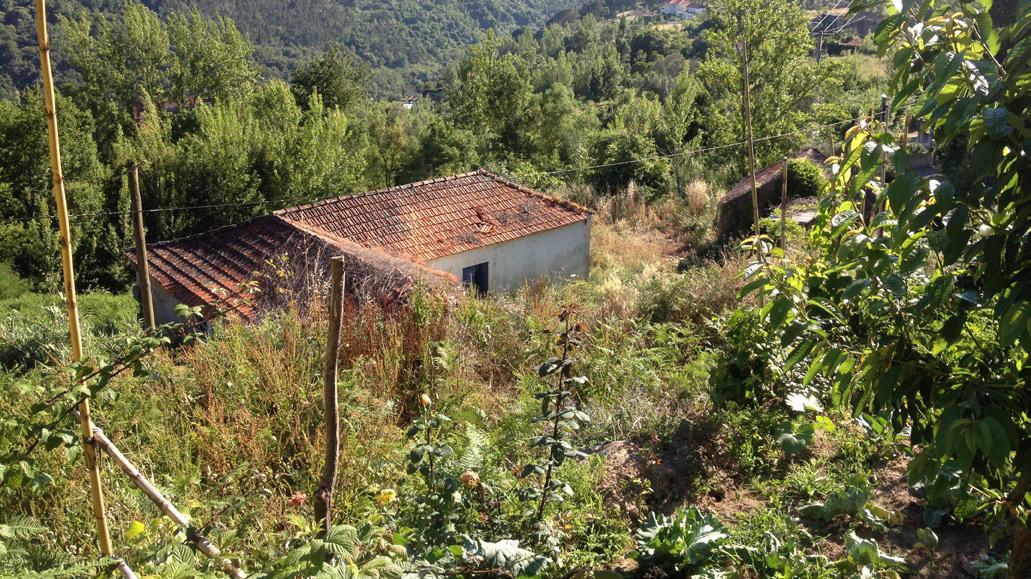
30
7 10 8 9
7 Venezuela y Portugal Flags in Portuguese Community event
8 Portugl 2016.
9 Puerto Cabello - Venezuela3.
10 Grandmother, sister, mom and nephew.
“You should accept and embrace your own culture. But in the end, no matter what others say is important, what truly matters is how you see yourself. Regardless of external validation from others, you need to selfvalidate - accept, embrace, and affirm your own story and identity.”
“ i believe my own cultural identity i S quite unique and cannot be pinned down to ju S t one country.”
“ d epending on which communitie S here and culture S i ’m feeling di S connected from, i will ju S t immer Se my Self in thing S in that language. So going back to like film, mu S ic, film and mu S ic would probably be the main one that i would try to.”
My heritage stems from Italy, Greece, and Syria. I was born in Rome, representing an already mixed-heritage background. During my childhood in Sweden, where I attended a public school for six years, I had the opportunity to immerse myself deeply in a new culture. It was a significant turning point for me. I learned Swedish as my second language and built my first profound cultural connection.
Moving subsequently to Slovenia for four years presented new linguistic and cultural challenges. I vividly remember introducing myself to new classmates and teachers, saying, ‘I’m Giulia, I’m Italian, but I come from Sweden.’ This confused them, as many people assumed that nationality follows a linear path, and they asked me to rephrase it. My limited English proficiency at the time hindered me from fully explaining my complex background.
Returning to Italy after my time in Slovenia, I encountered linguistic challenges within the Italian language. Addressing individuals in higher positions, such as teachers or figures of authority, required altering my narrative structure in a way I wasn’t used to. It was a difficult adjustment, as Italian was primarily spoken at home, and I had limited exposure to the higher grammatical structures. Consequently, I became hesitant to speak extensively in the classroom, fearing that I might mix verb conjugations. I then moved for three years to Greece, where I further explored a culture and language I had only ever spoken at home before.
Choosing Scotland for my undergraduate and postgraduate studies marked a significant chapter in my life.
Over those years, I embraced my mixed heritage and realised I didn’t need to fit into traditional Mediterranean cultures and stereotypes. Instead, I’ve created my unique cultural blend, finding a sense of belonging in the middle ground. I’ve come to understand that many others share this feeling of not fitting into a single culture and have found comfort in their own mixed cultural identities.
My linguistic abilities extend to Italian, Swedish, English, Spanish, French, and Greek. While fluency may vary due to changing environments, this linguistic diversity has profoundly influenced my personality. I’ve become adept at forming new friendships and adapting to new surroundings, but I’ve also faced challenges in maintaining long-term relationships due to limited practice during my youth. As a result, I tend to seek new interactions over prolonged connections. The fast pace of changing environments has also contributed to my more introverted, observant, and shy tendencies.

I consider various mediums, such as dance, music, films, and books, to be powerful tools for deepening my connection to my heritage, I can express my cultural identity and feel a stronger sense of self, especially through dance. Food also plays a significant role in confirming my mixed background. Combining recipes and cooking methods from my diverse heritages and experiences, I create dishes embodying my unique cultural blend. For example, I will use spices from Syria in my Italian dishes. Food is a way to narrate my background.
“ i ’ve learned that my interpretation of my own culture i S what truly matter S i ’ve di S covered that my ver S ion S tand S on it S own and Should not be compared to S omeone el Se’S experience S.’’
2 In Sweden circa 2001, first time I

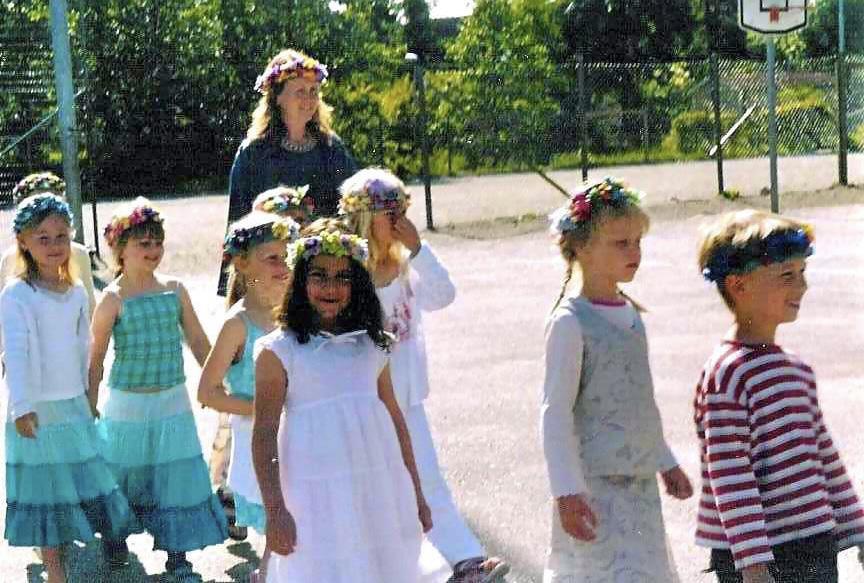
3 My first own home in Edinburgh and where my exploration and acceptance of my mixed heritage began, during lockdown, 2020.
4 My first time in the Middle East, I felt very really happy and at home. Circa 2018.

31
GIULIA 1 2 3 4
1 Me in Sweden with my classmates during Midsommar, circa, 2003.
explored with playing dress up and theatre play.
Hualing Nieh Engle 聶華苓 98 year S old
“
i wa S alway S the out S ider. i n taiwan, i wa S conS idered a mainlander. but even among the mainlander S there, i wa S S till an out S ider. i n iowa, i ’m S imply c hine Se. i n a merica overall, i ’m an aS ian a merican. m ainlander, out S ider, outca S t - i ’ve been labeled them all. i even laugh now during conference S becau Se i truly don’t know where i belong anymore.”
From 1925 to 2023, a span of 98 years, the overlapping shadows and complex imagery of this great era, from her homeland in mainland China, to her temporary residence in Taiwan in her youth, and settling in America from middle age until now, Hualing Nieh Engle transcended geographical and cultural boundaries, rose above political and historical divisions, using her consistently delicate and elegant strokes to depict her own winding and moving life, writing down memories of three life stages, three eras and three spaces of activity.
She fled through three generations. Military defeats, civil wars, the War of Resistance against Japan, the Sino-Japanese War, the Chinese Civil War.
As a child, because of her father’s association with the Guangxi warlords, she had to evade assassination by the Chiang Kai-shek forces, hiding in the Japanese concession in Hankou. In 1936, her father was killed by the Red Army while serving as commissioner in Guizhou. In 1937, when the War of Resistance against Japan broke out, she was 14 years old, and became a refugee student. In 1949, at the age of 24, she brought her family from mainland China to Taiwan, immediately participating in the Free China(自由中國)magazine founded by Mr. Lei Zhen(雷震) and Mr. Hu Shi(胡適) . In 1951, her elder brother Hanzhong died in an air force plane crash in Taiwan.
She couldn’t support the left because of what happened to her father, but wasn’t sure about their ideas anyway. At the same time, however, she wasn’t happy with Chiang Kai-shek’s government. She was very alone, neither on the left nor on the right, while it seemed everyone else took a political position. She couldn’t take sides - she was an outsider - so she began writing about the situation of the Chinese at the time. The title of the work was “Metamorphosis” (變形虫) .That was the beginning of her career as a writer.
Gradually, because of Free China magazine’s sharp criticism and incisive rebuttals of Taiwan’s social and political issues, after eleven years, in 1960, it was shut down by the government. Free China was banned, and Hualing Nieh was also put under surveillance by secret police. She lived in fear every day, not knowing which day she would be taken away like them. Lei Zhen was sentenced to 10 years imprisonment with deprivation of political rights for 7 years for “inciting rebellion”; As the only woman in the magazine, Hualing Nieh was not affected for the time being, but lost an important part of her life. At that time, Hualing was in another dark period of her life. The shadow of
*文中內容是作者經採訪和相關書籍摘錄,以饗讀者。
the Free China group had not yet been swept away, and her mother had passed away from cancer. If not for her two lovely daughters, she might have passed away long ago.
It was at this extremely depressed time that she met the cheerful, humorous American poet Paul Engle. In 1963, Engle came to Asia representing the “Iowa Writers’ Workshop” to recruit writers. At a party, he saw the quietly standing Hualing, the sadness in her eyes deeply attracted him, making him involuntarily want to approach and comfort her. In the autumn of 1964, with friends’ help, Hualing finally came to Iowa, Hualing’s marriage to her ex-husband was already beyond saving. After being separated for 7 years, they finally divorced. Hualing and Engle then embarked on a romance, with a poet’s romance and unique humour, he soothed her heart that had experienced many tribulations over the years. Finally he won her love. Hualing, who had faced adversity for half her life, finally gained a stable, happy home.
They lived in a pink house by the Iowa River, with a willow tree in front. In spring, the willow strands blew in the wind like misty rain, evoking a Jiangnan feel. On the hill behind, there was a hundred-year-old oak tree, thick and sturdy. Engle built a swing on its branches, where Hualing would swing back and forth, as if returned to childhood.
In 1991, when Engle accompanied her to Poland to receive an international cultural contribution award, he suddenly suffered a heart attack and collapsed at Chicago Airport.
Now, she still resides by the Iowa River, writing, writing, writing... What drives her is not success, but the sense of loss experienced time and again in life.
“ i am a tree with root S in mainland c hina, a trunk in taiwan, and leave S flouri Shed in iowa.”
After getting to know writers from many regions and reading their works, she discovered that the fate of the Chinese was also the fate of 20th century humanity. This feeling she gained from exposure to world literature expanded her horizons and influenced her writing.
When she came to Iowa in 1964, she lost touch with her mother tongue. She couldn’t make up her mind which language to write in - Chinese or English? She had already published seven books in Chinese but was also familiar with Western literature. Her novel The Lost Golden Bell,(失落的金鈴子)for instance, was one of the earliest examples of what had come to be called Modernism. She majored in English literature in college, then in Taiwan translated Henry James, Faulkner and other Western writers. After moving to the U.S., she wondered, should she now start writing in English? Or keep going in Chinese? She couldn’t write a word for several years. Then, one day in 1970, she sat down and wrote “Mulberry and Peach”(桑青 與桃紅)in Chinese on checked paper, and suddenly couldn’t stop writing!
32
*The content in this article is summarised and excerpted from interviews and relevant books and presented for the readers. The views expressed in the text solely represent the personal opinions of the interviewees.
以下內容僅代表受訪者的個人觀點。
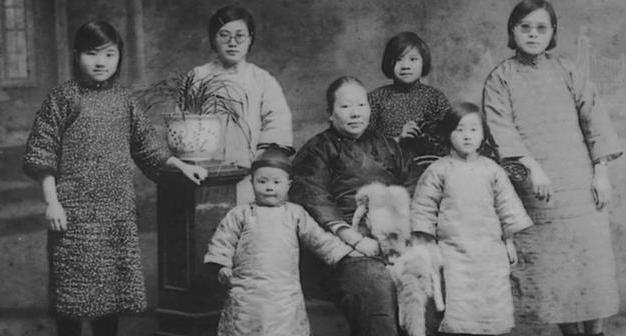
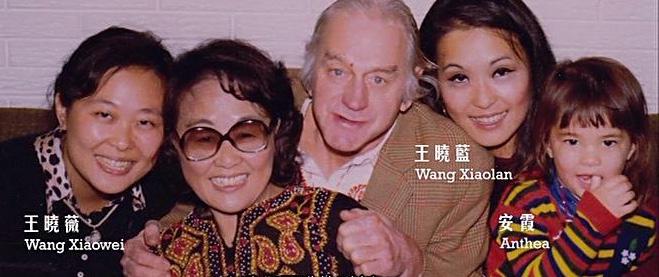
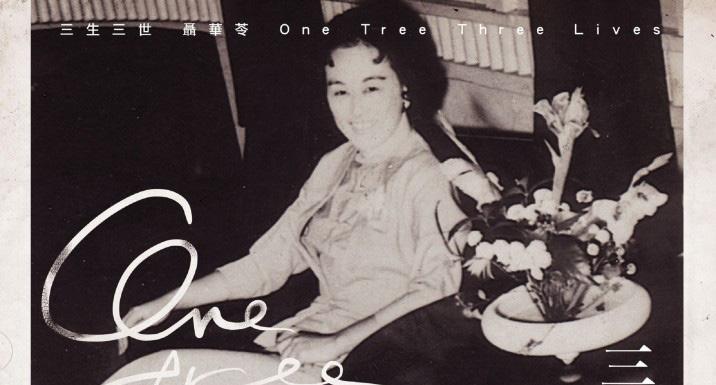




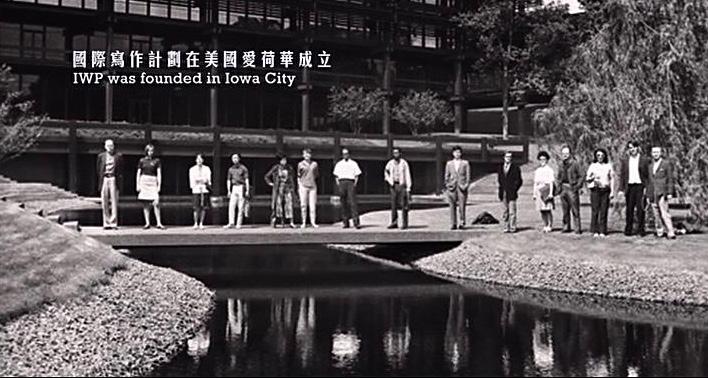

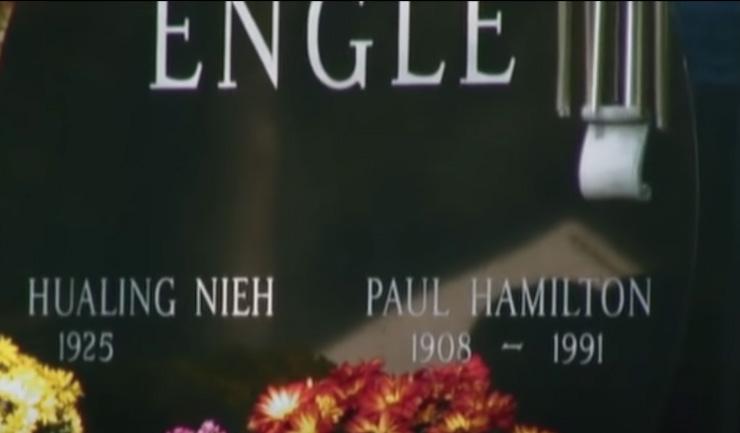
33 1 6 7 8 9 10 2 3 4 5
1 Hualing’s family. ©Hualing Nieh Engle
2 The poster of Hualing’s documentary. ©Hualing Nieh Engle
3 The picture of the Free China organizer.©Hualing Nieh Engle
4,5 Hualing and Paul.©Hualing Nieh Engle
6 Hualing, her two daughters, Paul, and their grandchild.©Hualing Nieh Engle 7 Hualing and Paul.©Hualing Nieh Engle
8,9 Iowa Writers’ Workshop picture.©Hualing Nieh Engle
10 Paul’s grave photo. ©Hualing Nieh Engle
Mulberry and Peach was very popular. The book depicts a Chinese woman’s struggles for her life in mainland China, Taiwan and America. It represented a fission of her Chinese and American identities into her writing. The Chinese magazine Asia Weekly named it one of the top 100 Chinese novels of the 20th century. From then on, she kept writing in her mother tongue. She has published 24 books so far. The Chinese experience expressed in another language feels like a skeleton without flesh and blood - like a Chinese person in an American suit. She feels closer to the Chinese writers who write in their native language
In 1966, after obtaining an MFA in fiction from the Writers’ Workshop, she suggested to Engle, now retired from the Workshop, that they start an international writing program specifically for writers worldwide. Their shared vision was to invite published writers from around the world to Iowa City to hone their craft, exchange ideas, and build cross-cultural friendships. With the University of Iowa’s support and private funding, the first group of international writers gathered in Iowa City in 1967 as the pioneering participants of the International Writing Program (IWP).
It was very expensive to bring writers from foreign countries, so they agreed should bring outstanding writers and emerging talent. Each writer was a costly investment. In the first year of the IWP, 1967, they could only afford twelve writers. There was Dai Tian (戴天)from Hong Kong and Ya Xian(瘂 弦) from Taiwan, Ryuichi Tamura (田村隆一)and Tauchi Hatsuyoshi (田内初義)from Japan, Fernando Afable and Wilfrido D. Nolledo from the Philippines. They also had Hans Christoph Buch from Germany, Sankha Gnosh from India, Eugene Nicole from France, Tahereh Saffarzadeh from Iran, Wilton Sankawulo from Liberia, Singaporean writer May Wang, and Daniachew Worku from Ethiopia.
In 1976, 300 writers from around the world nominated Hualing Nieh Engle and Paul Engle for the Nobel Prize for Peace.
*The content in this article is summarised and excerpted from interviews and relevant books and presented for the readers. The views expressed in the text solely represent the personal opinions of the interviewees.
*文中內容是作者經採訪和相關書籍摘錄,以饗讀者。
以上內容僅代表受訪者的個人觀點。
34
“My home in mainland China is gone. My home in Taiwan is no longer there, either. I’ve been here in Iowa for over 40 years. My children grew up here, my grandchildren were born here. I had a full life with Paul Engle. Iowa is my home. We hosted many IWP parties here. My house is too big for me now, but I’m still here. I feel it’s full of my life with Paul. It’s kept me going; I couldn’t live anywhere else. This is my home. I have more memoirs to write.”
“ i can tell when it’S genuine curio S ity and we might have S omething in common. but when there’S a confu Sed face followed by ‘ w here are you from?’, i think ‘ h ere we go again’. i t’S ju S t confu S ing when they’re perplexed and want me to explain everything.”
“ i am trying to See my Self not a S half of anything but a S a full per S on who’S had full life experience S - ju S t a bit more Spread out. i ’m S till working on fully embracing it for my Self and Seeing my Self a S culturally whole, i ju S t draw from more cultural reference S than one. i am making an identity for my Self that feel S like mine.”
“ r ight now i ’m taking a big S tep to explore my own heritage and identity by moving back to i ndia. t hi S i S a deci S ion i ’m making for my Self, not S omething i really want guidance on. i don’t think anyone ha S the right to judge whether it’S good or not. t here’S no one right way to feel about any of thi S.”
My dad is Indian and my mum is English. I moved to the UK when I was about four years old, after living in North India - not a long time, but formative. Nowadays when asked where I’m from, I prefer saying India, though I’ll quickly pass on the question, simply saying I’m half Indian, half British. If people seem surprised I don’t appear fully Indian, so be it.
I know about half the cultural references from the UK and half from India, but never feel fully part of either. It’s harder being a blend of both cultures without knowing many in the same boat.
Having moved around a lot and lived away from home, I lack really strong family ties, though I sometimes visit my Indian relatives. Much heritage hasn’t been passed to me - it’s always been independent learning. I wouldn’t describe my background well. I think it’s something I’m still trying to understand, a lifelong endeavour as a first-generation mixed race person.
I’ve tried engaging with communities of similar experiences - no one else half British-Indian, but all with mixed heritage. We relate discussing cultural navigation. The comfort is that no one asks your family history upon meeting - we all understand. Sharing is welcome but not expected. I know some ask where I’m from out of kindness, so I’ll adapt my answer, like saying I’m Indian but grew up in the UK. It gives them that feeling of connection.
I blend my two cultural sides in different ways. For example, my mum chose my first name to bridge bothit’s traditional in the UK and India. In Hindi it means “moonlight,” while in English it refers to a small, dark-haired boy, which suits me.
Growing up I learned both English and Hindi, though my Hindi has slowly faded over the years. This October I’m doing a Hindi language course in Delhi, as it’s something I’ve always tried picking back up in the UK, but struggle without immersion. I think learning the language will help me connect more to that side of my heritage, overcoming a persistent barrier with my family.
My dad and his family speak a particular dialect, while my siblings mix that with Hindi. So visiting India involves learning multiple languagesnever just one.
Like language, Indian cuisine has vast regional diversity. I enjoy cooking Indian food, though it doesn’t quite match my family’s tastes - I just experiment on my own. I’ll try making dishes like rajma in the UK, and attempt British food like apple crumble in India without an oven.
Growing up around white Brits, connecting to my Indian heritage meant embracing pop culture - musicians, films representing Indian and Pakistani culture. It created a sense of ties when I lacked an actual community.
My Indian and British families don’t interact much - I’m the only link. I don’t share a whole lot with them. I feel Indian in India and British in Britain.
My Indian family may judge me for my whiteness, while my white family judges my Indianness. They don’t appreciate why I’m confused or curious to learn more. I’ve long yearned for information about my life and family history, but it’s not deemed urgent or important to them. Much of my support has come from others in the mixed community, talking about our complicated lives and how we each navigate heritage. I learn so much hearing how others relate to their background.
I used to want to fully fit in, whether in Britain or India. Now I know I’ll always feel somewhat an outsider in both, but I don’t mind. I have lives in each place - friends, work, travel. Sure, some may see me as an outsider, but it doesn’t bother me.
Cultures intertwine with nations and citizenship, which I’m sceptical of. My identity on paper often mismatches how I feel. For me, anywhere could slowly become home through building relationships and belonging.
35 JOMAR 25 year S old
*Jomar is used as a pseudonym for the interviewee.
I feel I’ve become different since first coming to Britain. I think it’s due to cultural reasons, but living here has made me focus more on myself first, compared to when I was in China. Now I’m back in China, though I loved where I studied in the UK at the time, it was truly difficult to stay. These years I live between various cities like Changsha, Beijing and Shanghai, yet don’t feel I belong to any particular place, even country. I only feel I belong to myself. If forced to choose somewhere I feel belong, I’d liken it to a single room rather than a whole house - just having that one satisfying space is enough.

To be honest, I haven’t had time lately to contemplate identityShanghai is so massive and busy that you barely have time to think of others, let alone yourself. I still don’t know if this city is where I’ll settle down long-term. For now, I just try to focus on my own happiness - if I’m content here, I’ll remain. But I sometimes feel alone, like everything is meaningless.
You work 9 am to 9 pm just to pay rent, with no time to reflect on what you like or dislike - just sitting at your desk is enough.

Sometimes I think back to when I was studying in England, especially when I stayed in London. I felt relaxed there because everyone in London seems like an outsider, so I didn’t feel like I stood out. At that time, I always tried to experience new things. When I first arrived, I explored the local area instead of locking myself in my room. I visited different places near my home and used different languages to talk with locals, which could give me a new perspective compared to only learning from YouTube or other social media.
I’ve maintained this adventurous personality even now. Although I’m originally from a northern city in China, I’ve really tried to learn the Shanghai dialect. I feel this language can help me have deeper conversations with Shanghai locals, so I won’t feel excluded. During the long lockdowns, I couldn’t stand being cooped up for days on end. One day I left my room and knocked on my neighbour’s door, even though I had never talked to them before. I just couldn’t lock myself in my room any longer - I needed real human interaction. Luckily, my neighbours
were a very nice middle-aged couple. I went over for tea and opened up about struggling mentally during lockdown. After that conversation, we built a good relationship. So I think if you ever feel uncomfortable and want to find someone to talk to, you could ask for help from near people and also help to search for free mental health counselling services to express what you’re feeling.
Conversations allow the two-way exchange of knowledge and experiences. For example, when I was doing my postgraduate degree, I had discussions with my classmates from other countries and found the different cultural beliefs about where babies come from fascinating. The stories are totally different in Japan, Europe and ChinaJapan has fairytales about babies born in peaches, Europe has stories about babies delivered by birds, and China says they come from apple trees or rubbish bins! It’s really interesting to learn about other cultures. Not only do you gain new knowledge, but you also pass your knowledge to others.
I think that’s the power of sharing perspectives.


36 LUNA 31 year S old
“I cannot feel settled or like I belong anywhere. I’m a homeless who only belongs to myself. “
“I think it would be good for schools to teach respect for other cultures and backgrounds and bravely try new things - that’s quite important. As for me, I don’t personally struggle with this. I consider myself very open to people of all kinds of backgrounds. But if schools could support cultivating this openness and respect, that would be beneficial.”
“ m y grandparent S were all born and rai S ed in taiwan. i ’m 29 now, and when i wa S in nur S ery, my e ngli S h teacher S taught me to S ay i ’m c hine S e. t hat’S why i would S ay i ’m c hine Se. but when i wa S in primary S chool, when i S aid “o h, i ’m c hine Se,” there wa S a girl who turned around and S aid, “ n o, you’re not c hine Se. y ou Shouldn’t S ay you’re c hine Se. y ou’re taiwane S e.” t hat wa S the fir S t time i wa S in thi S weird S ituation of thinking “ w hat’S taiwane Se?” i t wa S S o funny to me. t hi S wa S back around 2000-2001 and i S till remember it clearly - it wa S the fir S t time i ’d heard the phra Se “being taiwane Se.”
If you ask me about the difference between Taiwanese culture and Chinese culture, I can’t really tell - it seems very similar, probably the same. But if you ask about pop culture trends, I don’t know. Culture can be so dynamic with many facets. I remember being invited to a Chinese New Year gathering this year as the only Taiwanese person there.
They were watching the Chinese New Year’s Eve TV show and I didn’t know any of the performers. I know that show is a Chinese tradition, like how Christmas is celebrated here by watching cliche films. But if you ask me to name Chinese singers or artists, I have no idea. Sometimes I can’t understand certain idioms or phrases Chinese people use. The Chinese we speak are a bit different now, also they could figure me out easily by the accent. It was a gathering that I do not very enjoy.
So when asked about my culture, I just say I’m from Taiwan, and the culture is similar to Chinese culture. There is a lot of history behind Taiwanese identity - it’s a very recent, 21st-century development. For me personally, I can say I’m from Taiwan, I’m Taiwanese, but I also celebrate certain Chinese cultural traditions in my own way. But there’s complexity behind what it means to be Taiwanese that is still evolving.
I’ve always doubted what the concept of “being Taiwanese” really means. I don’t know what defines Taiwanese identity, yet also know I’m not Chinese.
If asked about the concrete differences between Taiwanese and Chinese, I couldn’t pinpoint anything specific. Yet I don’t align with those who say if you’re culturally Chinese, you can call yourself Chinese. That broad identification has changed.
30 years ago, Chinese descendants in Singapore and Malaysia also called themselves Chinese. It was about ancestral ties and culture. But I feel that nowadays “Chinese” means specifically supporting China’s nation and systems - a narrower designation that excludes others self-identifying as Chinese.
Before, we could all happily call ourselves Chinese. But now people in Hong Kong, Taiwan, Singapore, and Malaysia are more reluctant to claim that label. I studied political science, so think a lot about how Taiwanese identity is being actively created by the government to differentiate from China. But I have mixed feelings - this seems more political than cultural to me.
It’s like the atmosphere in the early 2000s polarized people in Taiwan around identity without much healthy debate. You were either on one side or the other. I feel my own position got swept toward one side based on my southern hometown, a stronghold for one party. But is that faction really me?
Went to Taiwan after years away, and I felt like an outsider despite the familiarity. I can’t see myself living there now, though I don’t always love Aberdeen either. I feel more comfortable here - maybe without as many friends, but with a sense of independence. I don’t think I belong firmly anywhere. People should be independent, not claimed by any group or ideology.
Having spent 3 years in the UK, I’m often asked about my background, perhaps because Aberdeen is quite isolated compared to other Scottish cities. Some locals assume I wasn’t born here. A few times, people have randomly shouted Japanese greetings at me on the street, which feels uncomfortable. Assuming someone’s ethnicity based just on appearance doesn’t sit right with me. How you define some one’s race just by their appearance?
This likely also happens because the UK hasn’t had as much Asian immigration as the US - it’s mostly been Indian and Pakistani, not East Asian. When I visit my uncle’s family in California each summer, people don’t ask where I’m from as often. Race is a more sensitive issue there since America is an immigrant society.
I find it fascinating how some old Hong Kong films from the 80s/90s frequently used America to explore Chinese identity struggles, even while HK was under British rule. There seems to be something about the US setting that lends itself to exploring cultural dislocation and self-discovery.
37
Mark 29 year S old
*The content in this article is summarised and excerpted from interviews and presented for the readers. The views expressed in the text solely represent the personal opinions of the interviewees.
*文中內容是作者經採訪摘錄總結,以饗讀者。 以下內容僅代表受訪者的個人觀點。
For example, in the film ‘Comrades: Almost a Love Story’(甜 蜜蜜), which I watched in my early 20s, The main character that Maggie played struggled with her identity. When she meets her boyfriend Leon in Hong Kong, she lies that she was born and raised there because she speaks Cantonese. Leon believes it but still has doubts. Eventually, Maggie admits she’s actually from Guangzhou but has always aspired to be a Hong Kong citizen. I find it so interesting to see her almost trying to fake being from somewhere else. And by the end, she’s moved to America and is happy to get a green card there. She keeps wanting



to move and change her citizenship and identity.
It’s interesting how America plays a role in making Chinese people examine their identity in films. Movies about Chinese identity or self-discovery like ‘Full Moon in New York’ (人 在紐約), ‘An Autumn’s Tale’(秋天的童 話), and ‘Farewell China’(愛在別鄉的 季節) from the 80s/90s are often set in America.

These characters struggle with not feeling rooted in Mainland/Hong Kong/Taiwan but also not belonging abroad in the US.
I do resonate with that desire for transformation - feeling unsatisfied with yourself and wanting to hide and reinvent at that time.
“ t he meaning behind my c hine S e name y un Z hi i S that ‘yun’ (昀) meanS Sun, while ‘Z hi’ (知)meanS knowledge. So together ‘ y un Z hi’ S ignifie S S omething like “ S hining knowledge” or “S un S hine on learning.”
t he implication i S having extenS ive knowledge illuminated and enlightened.”
1 The poster of ‘Comrades: Almost a Love Story’(甜蜜蜜) . Copyright belongs to its production company.
2 The poster of ‘An Autumn’s Tale’(秋天的童話) Copyright belongs to its production company.
3 The poster of ‘Full Moon in New York’ (人在紐約). Copyright belongs to its production company.
4 The poster of ‘‘Farewell China’(愛在別鄉的季節) . Copyright belongs to its production company.
*The content in this article is summarised and excerpted from interviews and presented for the readers. The views expressed in the text solely represent the personal opinions of the interviewees.
*文中內容是作者經採訪摘錄總結,以饗讀者。
以上內容僅代表受訪者的個人觀點。
38
4 1 2 3
“I think my mother especially chose a name that didn’t sound Asian to me. As a first-generation Chinese American, she made sure all her children - me and my siblings - were born in France so we could claim that identity. She also ensured French was our first language, even homeschooling us while we learned English to keep us fluent. One thing she was certain about, however, was not wanting us to identify as Chinese. I’m quite sure it stemmed from the racism she herself endured, along with interracial marriage only becoming legal in the 1960s. All of this created generational trauma that she unintentionally passed on to her children.”
I was born in France and grew up in the United States. My dad is French and my mom is a first-generation Chinese American. I’ve spent most of my life living in large cities like New York, London, and Glasgow.
In very diverse New York, I felt pride saying I had also moved there, like most people. When I moved to London around ages 24-25, it had a different vibe.
With fresh political tensions from Trump’s America, despite my dual French-American citizenship, discussions often turned to politics and issues I wasn’t always keen to get into at that moment.
When I later lived in Copenhagen, the ethnic homogeneity made me stand out. This is where I first felt the racism and xenophobia behind “Where are you from?”, coinciding with COVID and me being half-Chinese. I sensed people wanted reassurance I was from a “good” country. So when I answered New York or Paris, which are both kind of true, you could kind of see the relief on their face, which I didn’t appreciate at all.
Now in Scotland, which is lovely and openhearted to foreigners in my experience, the question feels asked out of genuine curiosity again - a conversation starter.
One thing I dislike about “Where are you from?” is that until age 18, I had no control over my origins. Being homeschooled also contributed to my third culture feeling, as it was very isolating. I didn’t have friends my own age or meet kids until my late teens. This disconnected me from a typical American upbringing - no prom, sports teams, cheerleading or other shared experiences you’d expect.
So I usually exclude homeschooling when answering, though it significantly shaped me. My background was out of my control but is key to understanding where I come from. If trying to build a rapport, I share it. When asked why I was homeschooled, I laugh and say ask my parents.
It’s part of my past and I’d rather discuss my present and future. While I don’t control my cultural heritage, I’m pretty open about it if it sparks interesting dialogue and quickly facilitates making new friends. But I prefer to focus on what I have going on now and next.
I always expressed interest in Chinese culture because I absolutely loved my aunt, who was a flight attendant that travelled the world but called Shanghai home.
As a kid, I was fascinated by the idea that when I grew up, I would visit Shanghai with her. She taught me basics like counting in Chinese. But my mother never really encouraged or forced it, despite seeming to like the idea. I’m not proficient in Chinese, so immersing myself in it would just be really difficult and remind me that I don’t have a strong grasp of the Chinese language and culture.
39 MIA 29 year S old
My mother didn’t actually connect me with Chinese culture at all. She picked my very French/American first and multiple middle names - again, not wanting us to have that background. She said she chose a name that wouldn’t get my CV automatically discarded. When applying to American universities with quotas for foreign students, Asians are expected to perform higher than non-Asians. So she had me identify as mixed race or Caucasian rather than Asian. Looking back, it’s a shame she felt that way and tried to hide my heritage, I don’t know how much thought she put into all of this, but she had a complicated relationship with being Chinese herself. I think by avoiding any Chinese cultural ties, she aimed to shield us from the pain she endured. As a mother wanting the best for us, that was her priority initially. At some point, as we became teenagers, she should have asked for our opinions, which didn’t happen. But it started from wanting us to have an easier life as cute FrenchAmerican kids, whether that was the right approach or not is up for debate.

Growing up, my mother had a very complicated relationship with identity that I still haven’t fully unpacked. As a kid, she really wanted me to perform and be outgoing, though I was deeply introverted and mortified by that. At that time she also kept pushing me to record audition tapes to send off, like for a role as a young girl with Matt Damon as the father. When I was 12 or 13, I pointed out that unless they cast an Asian actress as Matt Damon’s wife, casting me wouldn’t make sense. My mother got very upset, thinking I was just being negative and difficult. To me as a kid, it was obvious they wouldn’t cast Matt Damon with an Asian wife, and I was a terrible actor anyway. Everyone would know a mixed kid wouldn’t be the
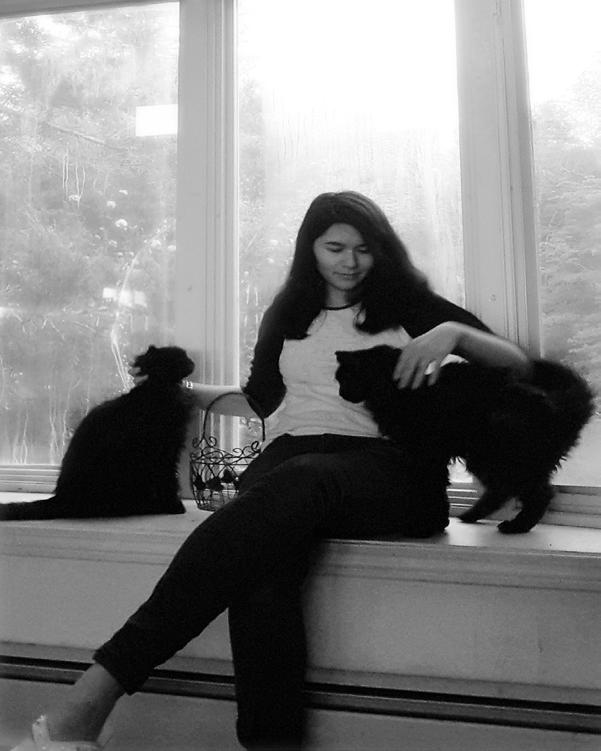

child of Matt Damon and some blonde woman - that’s the typical casting. The typical absence of mixed kids on screen was obvious. I was happy when non-American minorities like Hispanics were represented in blockbusters, even if not Asians. It’s not like I would rather be not a mix, but I’m very aware that this is what I’ve got. I don’t see myself the same way that everybody else sees me. People still use the word exotic. They still use the word world traveler, things like that, when I’m really not. I’ve move places when I have to move for work. And then that said, I don’t have that free spirit that a lot of times they think comes with being, having seen a lot of the world or being multicultural.
It did bother me for a while that when I was walking down the street with my dad, people might think I’m like a young girlfriend. Also when I date someone, I will thinking do they have an Asian fetish? Do they think I’m gonna be different than whatever? I don’t really see it as a positive, let’s put it that way. When it comes to society, there are more often it comes across as a negative, but I also try not to let that bother me cuz again, the negative is very much a reflection of society or university or whoever’s in that system. It’s not really a reflection on me actually. Many Chinese American friends I had in university could relate, under intense pressure to fit in and perform while still meeting parental expectations.
I don’t know if any of this relates to my mother’s unresolved identity issues. But for my own future kids, I don’t want them to grow up feeling that complicated, not looking like one parent or the other. I’d rather adopt a child fully aware from the start we don’t resemble each other physically - and be fine with that.
“You are unique - your story and background are unique. But most people you meet will also have some internal struggle or conflict. Just because yours spans the globe doesn’t make it more important, weighty, or pressing than someone from one place battling equally strong confusion. Don’t get too arrogant about having seen more of the world or speaking more languages than many, even if it’s just one extra. Let’s not act like we’re part of some prestigious yet troubled elite island. We have a lot in common with non-crosscultural people in figuring out our identities, origins, what they mean for us, and who we want to become.”
40
1 2 3
1 1999, Piano 2 2010, Marmalade Pronto
3 2017, Anise
MICHELLE ZAUNER

“ i had Spent my adole S cence trying to blend in with my peer S in S uburban a merica, and had come of age feeling like my belonging wa S S omething to prove. Something that wa S alway S in the hand S of other people to be given and never my own to take, to decide which S ide i wa S on, whom i wa S allowed to align with. i could never be of both world S , only half in and half out, waiting to be ejected at will by S omeone with greater claim than me. Someone whole.”
Michelle’s mother was Korean and her father American. She was born in Seoul, South Korea and moved to the US with her parents when she was just over one year old. Like many East Asian parents, Michelle’s mother was strict and constantly pushed her to be the “best version of herself.” As a teenager, Michelle had a terrible relationship with her mother, with frequent conflicts. Once they even got into a physical fight neither would back down from. Michelle had never seen a peer’s mother behave this way - if she got hurt, her mum would scold rather than comfort her. She’d cry in distress, and her mother would say to stop crying and save it for when she died. But beneath the scolding lay unspoken love. When Michelle started primary school, afraid she wouldn’t grow tall, her mum made her grab the bed frame each morning and pulled her legs to stretch them. When Michelle slouched, her mum would tap her back saying “stand up straight.” East Asian parent-child bonds hold contorted, conflicting emotions - the hurt so tangible, the love equally tangible.
All second-generation immigrants grapple with identity issues. At university on the east coast, Michelle was often mistaken for Japanese or Chinese by classmates. Though she attended Korean language classes, Michelle didn’t learn much and spoke little Korean. Her time in Korea consisted of listening to her grandmother and aunts chattering away in Korean, unable to access that “Korean” part of her mother.
The wounds of adolescence gradually healed, and Michelle’s relationship with her mother improved, though her mother’s cancer diagnosis allowed them more time together. In their limited days, Michelle helped bathe her mother and tried to learn Korean dishes to feed her, but the illness ruined her appetite. Watching cancer slowly destroy her mum, seeing her weaken bit by bit until she finally faded, Michelle could do nothing.

41
old
34 year S
Losing her mother, Michelle lost part of herself too. This drove her to gather “evidence” that her Korean heritage hadn’t disappeared along with her mum and aunt (who also died of cancer). Michelle began frequently visiting Korean grocery stores and following YouTube channels to learn the dishes her mum had cooked, reconnecting with her through familiar tastes. Food represents generational continuity in a family, each household having distinct flavors.
After her mother’s death, this knowledge became a scar, underscoring their unfinished mother-daughter relationship, the contradictions between 2nd-generation and 1st-generation immigrants, and the clash between her Korean blood and mixed American status. Food became an anchor synthesizing emotion and reason, like her hidden middle name Chongmi (also her mother’s name). During her mother’s illness and death, it anchored her feelings, reflections, and the meaning and duty behind her half-Korean bloodline. Food opened passageways to private memories and functioned as a time machine - letting her retreat to her corner for self-healing through making kimchi, while also giving her courage.

If food was the silent language connecting her to her mother, then music was the audible channel for emotion. Her mother bought Michelle a guitar at 15, starting her music career. After university, while working jobs, Michelle explored her musical path, dreaming of her own stage one day. Like many parents, her mother didn’t support her songwriting and singing ambitions, doubting she could succeed and wanting her to give up. It seemed farfetched for an Asian to make it in Western mainstream music.
But in April 2016, her band Japanese Breakfast released their debut album “Psychopomp”. The cover used an old photo of her mother in her 20s in Seoul. This record brought the band some renown. Their third album, “Jubilee”, came out in June 2021 and was nominated for Best Alternative Music Album at the 2022 Grammy Awards.

42
“My mother had struggled to understand me just as I struggled to understand her. Thrown as we were on opposite
sides of a fault line—generational, cultural, linguistic—we wandered lost without a reference point, each of us
unintelligible to the other’s expectations, until these past few years when we had just begun to unlock the mystery,
carve the psychic space to accommodate each other, appreciate the differences between us, linger in our refracted
commonalities. Then, what would have been the most fruitful years of understanding were cut violently short, and I 1 2
was left alone to decipher the secrets of inheritance without its key.”
1 Psychopomp ©Japanese_Breakfast 2 Michelle and her mum ©Michelle
I grew up in Malaysia learning three languages - Mandarin, Malay and English. It is very common in Malaysia to be conversant in at least two or three languages due to the multicultural society. After growing up, we can adjust which languages we use more regularly based on personal preferences. I am currently learning French as well because of my French partner.
I lived and studied in Singapore for around 10 years, completing both my undergraduate degree. Afterwards I stayed living in Singapore for several years for work. Now I am finally living in Glasgow for my master’s degree, though my Singaporean-influenced English refuses to leave me - the Singlish accent still comes through when I speak, marking me as someone who lived in Singapore. In Malaysia I mainly spoke Mandarin with my family and Malay with neighbors while growing up, so my Malay has faded quite a bit over the years. However, in Singapore I spoke mostly English on a daily basis, though not all Singaporeans are bilingual English-Mandarin like me.
My cultural background and upbringing definitely influences my sense of belonging and identity. I’m originally from Johor Bahru in Malaysia, right on the border with Singapore, so growing up I was very closely connected to and familiar with Singapore. I visited Singapore almost monthly as a child and teenager. People would jokingly ask if you’re from Johor Bahru, aren’t you basically from Singapore? In terms of food and cooking I still identify as Malaysian, but financially and for work opportunities it was like being half Singaporean because of the close ties.
Adapting to the very diverse workplace culture in Singapore when I first started working took around one month to feel comfortable. My job required me to use English for everything - meetings, presentations, talking with managers - which forced me to quickly improve my English fluency, though colleagues were kind enough to let me first explain my ideas in Mandarin so I could express myself. With teammates from India, Vietnam, Britain and elsewhere, we used tools like Google Translate when needed to bridge language gaps. It takes time and patience from both sides. I was fortunate my colleagues were very openminded which helped overcome obstacles.
To maintain my cultural connections and heritage now living away from home in Scotland, I often cook classic Malaysian and spicy Asian dishes to make me feel like I’m back home. I also regularly watch related media from Malaysia and Singapore, keeping up with news, entertainment and social media from home to stay rooted. Calling family and friends back home is also important. Food brings joy and helps me feel more at home and less alone. The smells and tastes spark memories of my upbringing.
When extremely homesick, I cook comfort foods from home that my mum used to make and call her to hear her voice. Looking at old childhood photos and videos makes me feel still connected to good times growing up. I also make sure to go out frequently and not just stay cooped up at home, which can worsen homesickness. Long walks along the beach here bring a sense of calm. Chatting with close older friends who act as mentors helps put my feelings of loneliness in perspective.
In Singapore I often felt like an outsider or guest living in my rented apartment with a landlord. The space didn’t feel like my own. When cope with lockdown isolation, I deliberately went out every day to exercise, grocery shop, or just wanderanything to not just stay inside. Keeping busy and active was key.
I’m quite sensitive to differences in accent and pronunciation from growing up distinguishing between Mandarin accents spoken in Taiwan, China and Singapore. In Singapore, learning English was heavily influenced by absorbing the local Singlish accent, which unfortunately isn’t an ideal foundation for proper English pronunciation. Since then I have actively tried to improve and speak clearer British English without losing the Singaporean lilt I’m fond of. Accent doesn’t matter to me as much as correct pronunciation. I want to pronounce words properly. I haven’t experienced stereotyping or discrimination regarding my multilingual background so far, though navigating diverse accents can be challenging.
Overall, maintaining cultural identity while living abroad requires effort - cooking familiar foods, consuming media from home, connecting with family and friends. But new experiences are gained too. Food remains a central comfort no matter where I am.
1 Cooking at Home during Covid while Working
2 First Time Cooking Chicken Curry in Singapore during Covid
3 Discovering Malaysia in Glasgow
4 Cooking and Inviting Malaysian Friends Over in Glasgow
5 Cooking at Home during Covid while Working
6 Like-minded Friends Dancing Zumba Together
7 Good Friends from University Days in Singapore
8 Glasgow Room with a Photowall, Also My Moodboard
9 Gathering of Singaporean Friends on a Trip to Amsterdam
10 Roommates and Friends in Glasgow
11 Friends from Work in Singapore
12 First Outing with Boyfriend After Being Together
43
MIN 29 year S old


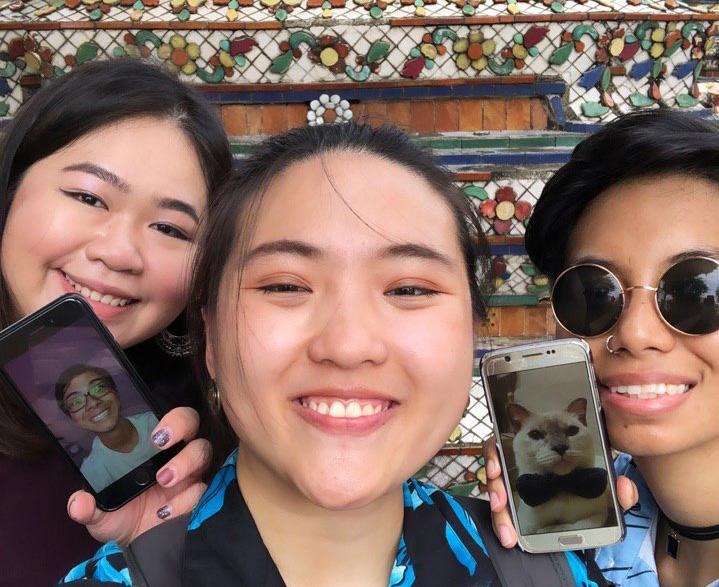









44 1 2 3 6 5 4 7 8 9 10 11 12
My mum is from Japan, but my dad is from Northern Ireland. When I grew up in these years, If someone asks where I’m from, because if I think if someone who is of Asian ethnicity asks me, then I would straight away say Japanese because I feel like I assume they’re asking where in Asia I’m from. And then if it was a Scottish person, I’d probably say England to just let them know that I’m not Scottish. But I usually say that my mum is Japanese and my dad is Northern Irish. Because I feel like usually people, when people ask where I’m from, they’re wondering why I look like a mix-raced.
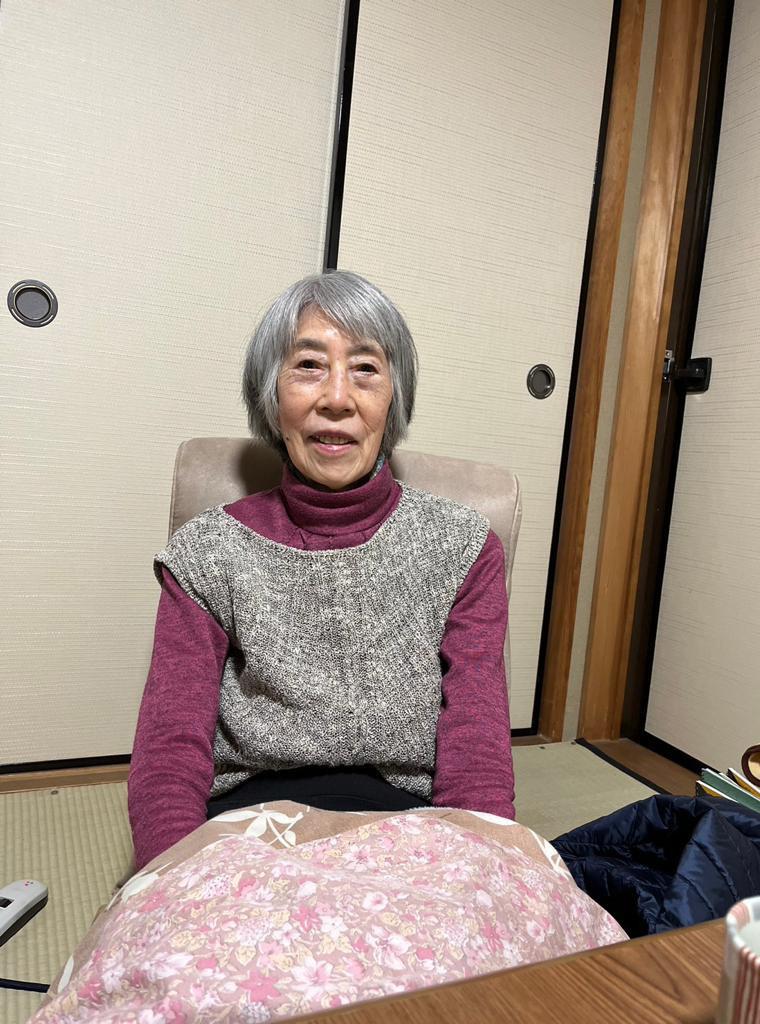


I was born in Japan, then moved to Malawi in Africa as a young child. I later moved back to England for a few years, then Malawi again. Now I’ve been in Scotland for five years. In my formative years, I was fortunate to have an English accent, so people generally didn’t treat me as a foreigner. But walking in small Scottish or English villages, locals would stare, trying to place my ethnicity. Even Asians looked twice, because unable to easily identify my background. Also in Kenya as a kid, my mum would get angry when people yelled at us in Chinese on the street - just one frustrating stereotype that there are a lot of stereotypes that are specifically Japanese or Chinese or from anywhere else in Asia, but everyone seems to think they’re all the same culture.
As a child, people held no positive attitudes about my diverse origins, only stereotypes. But today with Black Lives Matter and awareness of racism, I feel people appreciate multiculturalism more. Social progress now interests people in my background in a supportive way, unlike when I was young. If asked to model for a diversity campaign, I’d assume it’s to appear inclusive, not because of me specifically. So attitudes have changed.
While I’ve lived in different cities and countries, belonging for me means having a solid group of friends somewhere. When I first moved to Glasgow, I felt an outsider. But after nearly five years here with a close group of friends, it’s certainly home now.
45 MIO 23 year S old
“Mio means beautiful cherry blossom in Japanese, and that’s because I was born in spring, which is the time in Japan when it’s covered in cherry blossoms. So they named me Mio.”
I don’t eat much Japanese food now because I’m not very good at cooking it. But if I had to choose my last ever meal, it would be something my mum had cooked. I stopped living with my parents when I was 13, so I didn’t really get to watch my mum cook and learn like most kids do as they grow up. Because I was live away from her, I never picked up her cooking skills. But hopefully one day I could learn.

One of my favorite parts of visiting my parents is my mum’s cooking. She can also afford the special Japanese ingredients, which I won’t buy as a student. The cuisine is probably one of the best aspects of the culture - I think Osaka, my mum’s hometown, is known for appreciating food and loving eating.
Apart from the food, I’ve also tried using the language to connect with my culture, which I’ve been attempting forever.
When we lived in Malawi, an English and Chichewa speaking country, my mum worked a lot. So a Malawian babysitter, who didn’t speak Japanese, looked after me. We’d only see my parents after work, and apparently I’d just reply in English. My mum said she gave up trying to teach me, but I think she could have tried harder. I started formally learning Japanese when I was 13 at a school that offered it as a subject. But since leaving at 18, I’ve lost proficiency. Learning the language would definitely deepen my cultural ties, but it’s very difficult when not living there. Even back home with my English-fluent mum, we sometimes miscommunicate or she doesn’t understand me.
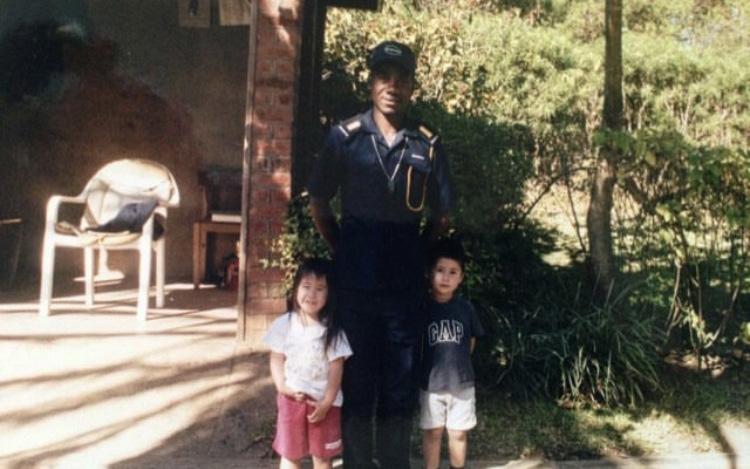

There are also language barriers that make me feel like an outsider when I’m in Japan. Experiences like getting a haircut, where my mum drops me off at the hairdresser’s and explains in Japanese what I want, then leaves me there while my hair gets cut, make me feel very much a foreigner. Everyone around me is speaking Japanese in an all-local hairdresser’s, and I’m just a new face who can’t speak the language, even though people probably assume I can because I’m getting my hair cut there. I also feel like an outsider because my fashion sense is so different to what people who live in Japan typically wear - I think UK and Japanese styles are very distinct.
But even when I went to school in England, and now in Glasgow, I think it’s more of a perspective thing, because I don’t tend to worry too much about what people think of me or what I “should” feel. I just try not to let other people’s impressions or opinions affect me, and aim to be myself without feeling pressured to conform to a specific culture. I try to detach my personality from cultural expectations.
46
*文中內容是作者經採訪摘錄總結,以饗讀者。 以下內容僅代表受訪者的個人觀點。
“My high school was a boarding school in the States. One teacher who left said the international students were treated like second-class citizens. I think we were often just tokens - the Asian token in class to appear diverse. But they didn’t really care to engage with that diversity, only wanting our money.”
I am originally Chinese and spent almost nine study years in the US before coming to live in Scotland.
When asked where I’m from, I’m more likely to say Beijing, though I’m actually from nearby Henan Province. Partly due to regional bias against Henan, but also because when studying in the US, saying “Beijing” saved time explaining. Now I say I’m from both China and the States, having lived in the latter long enough to be shaped by it. I became more aware of my Asian and Chinese heritage when I was a minority in the US.
Even in China, it’s hard to define my background given regional differences. Externally, China appears a homogeneous country and culture. But internally, we know the diversity. I generally cite my culture as Chinese, though re-evaluate this when abroad.
Reflecting on my time learning in the US, there was more openness to diversity then compared to the Chinese approach. In China, we tend to emphasize grand narratives, whereas Americans took more patience to learn about new Chinese perspectives. Sadly, due to the current tense relations between the two countries, that openness has diminished.
When I first arrived at boarding school, a reception teacher asked for my “English name” after I shared my Chinese one. Most Asian students had English names for easier pronunciation, so I didn’t think much of it then. But in hindsight, it was problematic to just assume I had one. I think this teacher was ignorant within his own culture’s norms, while I felt pressure to assimilate as a young foreigner. At the time, I assumed their ways were right. I later came to hate the English name I chose. Now I only use another English name when wanting privacy. I feel our school used Asians as diversity tokens, caring little beyond our tuition money that supported amenities like sports facilities.
University felt different - the school tried shifting from asking “where are you from?” to “where do you call home?” to be more inclusive. Though unsuccessful, it was a nice attempt. I became more comfortable engaging across cultures with supportive tutors and minority/international student events.
If you’re challenged by cross-cultural dynamics, try reframing difficulties and reflecting on them. Seek help by talking to others with similar backgrounds. Connect with them, find mentors, do activities together, and build relationships.
“ aS ian S have a weird pre Sence in the State S. g rowing up, you rarely S aw aS ian face S in popular Show S or film S but when i vi S it the State S , i ’m S urpri Sed by how many aS ian S there are, even though they’re not repre Sented in media.”
There’s always an ‘othered’ feeling for Asian Americans. I relate deeply to the book ‘Minor Feelings’ - it articulates sensitivities I couldn’t, or even experiencing self-hating when seeing myself how white people might. I sometimes struggle with those feelings of being the only minority in a room. That book perfectly captures the Asian American experience.
Currently, more Asian American women are writing books reflecting their stories - Asians are standing up to document perspectives. Growing up without many shared influences, I tried absorbing mainstream American culture, heavily Eurocentric in its portrayal of “world cultures.” The inclusion of African, Asian, etc. perspectives was not balanced - it was taken as just how things were in the American education system. So I think I was just trying to familiarize myself with English and American norms back then.
But reflecting now and reading more of these Asian narratives, I realize I didn’t see myself as Asian or Chinese until becoming Asian in the US context - similar to not being born a woman but becoming one. I’ve just started processing how this identity shift happened through reading those books and stories.
Having a multicultural background allows you to appreciate different cultures rather than seeing it as wrong, since most people only know a single culture. Childhood friends in China don’t understand my questioning - they just accept the way it is and stay within familiar bounds. I disagreed with many things during the pandemic lockdown - I felt disrespected and lacked the privacy and autonomy I used to have. Those environments made me feel like an outsider, then I decide to leave my country.
Living abroad, you view things differently than when confined within one country. With an outsider view of both China and the US and the U.K., you see beyond a single narrative.
I don’t feel 100% Chinese or American, but that total comfort and sense of fully belonging is something I’ll likely feel when extremely settled into a place. I may sometimes feel singularly aligned, but identity is ever-evolving.
47
Rachel p o S t 95S
*The content in this article is summarised and excerpted from interviews and relevant books and presented for the readers. The views expressed in the text solely represent the personal opinions of the interviewees.
*Rachel is used as a pseudonym for the interviewee.
I am not the first person to have dual heritage and third culture experience in my family. I am in a somewhat awkward situation - I can’t confidently speak about these experiences to others, always feeling like an impostor.
This impostor feeling stems from two things: my appearance/name, and stereotypes. Despite different generations in my bloodline, I look fully Asian with a traditional Asian name. I didn’t know until my grandpa passed that I also have a Russian name he chose - Viktoriya - though I’ve never used it. My name doesn’t define my identity - with nicknames, I have five names and enjoy using different ones in different settings to protect parts of myself.
The other is stereotypes about Russians. Before the war, upon hearing my heritage, people assumed I’m good at drinking and have a wild family. Now after Ukraine, people subtly treat me differently, assuming I share the Russian government’s politics - not overt but uncomfortable. I understand Russia blurs national and self-identity over time, so I’m guarded when asked.

I quite enjoy life currently studying in Scotlandpeople don’t care about others’ life much here. It’s vastly different from my upbringing combining extreme Asian and Russian cultures, where even strangers seem to watch my choices, wanting me to have my next 20 years planned out on the “right path” as my parents say. I can feel powerless to conform to others’ expectations - you could be different but not too different. But my parents were relatively open-minded compared to most Chinese parents on some things. I could call them by name directly in the home, quite simply showing their lack of show off their parental power. They were also open to my stance on not wanting marriage or children, as I want to focus on myself first. So there was a balance of freedom and restraint - I could be anyone within limits, as they held the kite string to keep me from flying too high.
Our family is very sensitive to the wider context, almost paranoid, learned from ancestors. My great-grandfather was a Soviet Red Army soldier in WWII. He took one of his sons, my grandpa, to China as a teenager. My grandpa adapted to a totally different environment growing up, which I’m curious about now but was too naive to ask him more about then. After 10 years in China, my great-grandfather was arrested as a suspected Soviet spy during the Cultural Revolution, dying in prison after solitary confinement. My grandpa had to collect his father’s body and solve all the subsequences things when he was just high school age. Although my great-grandpa was politically rehabilitated ten years later. This greatly shaped how my grandpa and dad chose to educate me.
They never discussed such things in front of me, though Grandpa read Reference News each morning and Dad watched Phoenix TV News at night. As a child, I couldn’t comprehend it all, but I’d sneak my grandpa’s books in the bathroom, reading many biographies which he bought. I learned identity is influenced by politics, worldviews, language, family, and subjectivity - addictively exploring this invisible heritage through memoirs.
Before grandpa’s passing, I rarely discussed my background, feeling little obligation and right to recount what I only played a small part in the family history. When he died, I realised how little evidence there was of his presence. I couldn’t even remember our last years well, as I was at boarding school and bullied then. I don’t want to relive that traumatic time, so it’s hard to recall the details of our interactions. I still couldn’t remember those memories until now. Everything is like fragments in my mind. The next year when my grandpa passed, Disney’s Coco was released, it depicted souls in the Land of the Dead existing only if remembered by the living. I cried so much when watch it, I learned the importance of preserving family memories and traditions. It hit me - I needed to learn my family history and maintain our heritage.
So I asked my dad about this, who’d never told me initiative this before but now agreed to share a little, showing me his photo albums - the first time I saw those photos, he even scanned those to be digital versions before I asked. I started researching the photos, sadly finding few with my grandpa when I grew to be a teen. After that, then I always use the camera to memory everything in my life, every people I met. That could preserve memories. I’d even forgotten how grandpa looked in his final years, as I wasn’t at home then. But the more I look at old photos, the more memories resurface. Seeing our previous house sparks recollections of sunny childhood afternoons at my grandparents’, listening to accordion music or Soviet folk music. Finding my granddad’s old Russian books reminds me of sensing language’s power even then. Every year for grandpa’s birthday, I’d handmake a Russian card, messily painting words without knowing the proper stroke order. I remember how the first card surprised my family and grandpa. I kept this up until his final birthday - just scribbling a rushed card to see friends. He had a fatal heart attack days later, my biggest regret.
48
REBECCA 24 year S old 1
I’ve wanted to properly learn Russian since realising that power. But dad always said I could never master it, as I couldn’t pronounce retroflex sounds or pronounce it like a native Russian without an accent - unlike him. That broke my young heart, so I rejected learning it around my fluent family to avoid seeming awful at it. But I remain interested and may learn without them knowing in future. Old photos of dad and grandpa remind me of how dad admits jealousy over my different treatment from grandpa, who raised him strictly - no lounging on beds on day, silent meals, immediate utensil cleaning, sparse praise. I even knew my grandpa’s safe‘s code before my dad.
Though not first-generation dual heritage, both cultures shaped me. Grandpa would swing me around as a toddler, which I think gave me height. Oat porridge breakfasts - maybe why I easily accept simple food now. Friends see my orderly obsession as a Russian trait.

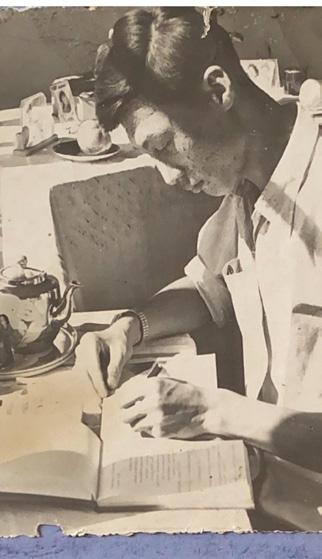






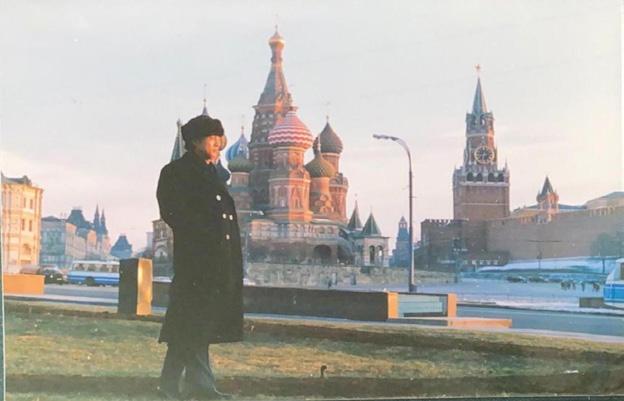
After self-exploration, I wanted to hear more people’s identity experiences. My first ethnography project with bilingual couples taught me more. I did data visualizations categorizing people in simple terms but felt these stories deserved more than decoding - hence this project sharing the original narratives. The individual work has been tiring but rewarding, making me feel fortunate to be multicultural, these things building me.
I’m now proud as the brave first-generation’s granddaughter.
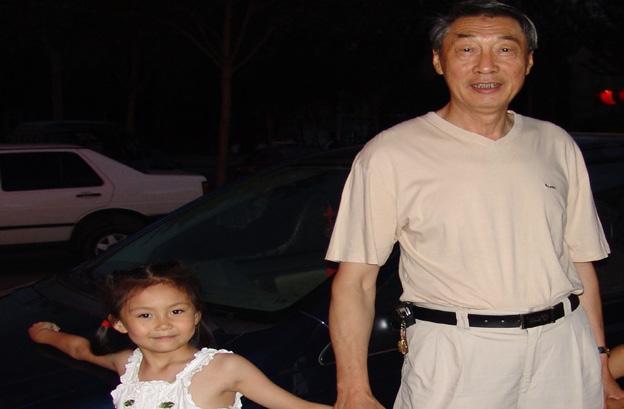
49
1 The postcard my grandpa sent to my dad from Moscow when my dad was in middle school, “Hi son, greetings from your father.”
10 My grandpa and me.
2 3 4 5 6 9 10 8 7 11
11 My grandpa used this exercise to stretch me as a toddler. Though it may appear concerning, I actu ally enjoyed it a lot, as did my parents who recorded it on VHS. These screenshots are from that video. I loved being swung around by my grandpa in this way as a little kid - it worked for me personally. However, this is not recommended for every parent and child.
2,3 My great-grandpa. 4,5,6,7 My grandpa.
8 I’m standing on my grandpa’s bookshelf.
9 A treasured photo of my grandpa and me in our favorite park by my beloved spinning slide.
“But what about the experiences of second-generation kids like us—like feeling ashamed of the lunches our parents packed us because they were too “ethnic”? Or having to translate things for our parents because our English was better than theirs? Or struggling to communicate with our relatives in our home country because our Mandarin/Cantonese/Hindi/Korean/Viet was absolute horseshit?”.”

Simu was born in Harbin to a typical Chinese intellectual family. His grandfather was a chemistry professor, grandmother a paediatrician, and parents among the first university graduates after China’s restoration of the national college entrance exam. In China’s early Reform and Opening Up period, with massive influx of Western ideas, his parents decided to seek opportunity abroad. The plan was for dad to apply for a fully funded PhD overseas, getting a study visa so mum could accompany him on a spouse visa, secure their foothold with scholarships, then bring over the kids. But things weren’t as smooth as imagined, with money a big issue. His dad attended classes during the day, his mum studied language, and at night they washed dishes together. His parents gambled everything on their dreams and better life.
Finally, effort paid off, they prepared to bring Simu over, this is why he didn’t arrive in Canada until age 5. They thought the family was finally reuniting to start a new chapter, but it wasn’t so simple. Until 5, Simu lived in Harbin with his grandparents, seeing his actual parents rarely. Arriving in Canada, unable to understand the language and with both parents in class all day, he was often home alone waiting anxiously for them to return, feeling very lonely. Apart from initial detachment, his parents’ failed parenting approach triggered rebellious psychology, widening the rift. Their style was essentially tiger parenting - harsh, simple, and violent. In Canada, mum demanded he recite vocabulary before bed or he couldn’t sleep, berating any lapse in concentration. In primary school, once caught lying by dad who broke a promise by telling mum, she immediately dragged him outside, locking him out. He gradually realised he’d never get parental love, home becoming battlefield rather than sanctuary. He decided to resist uncompromisingly, refusing to compromise, the rift with his parents now open. He left for university without an ounce of longing for home. Homesickness was for those with actual homes, he said.
He no longer cared about grades, craving to be seen, appreciated, liked, intimate - filling emotional voids from before university. Despite poor grades, he leveraged his natural showmanship to land an audit role at Deloitte. But he took no interest in the work. He dodged work however possible until getting fired for failing the CPA exam, ending his accounting career. This first unemployment was a rude awakening, finally exposing him as a fraud.
He had masked his instincts, flattered others, stumbled along, but couldn’t contain his slacking core and wildfire dreams, the illusion now shattered with his parents’ money wasted and him finally free to walk his ‘bad’ path - he want to be an actor. His persistence paid off - becoming the lead in CBC’s Kim’s Convenience. Through sustained engagement, he met Sony’s famed Asian producer and streaming’s top Asian influencer.
At this stage, though acting chances were slim, he was more a social activist, aware of issues facing Asians locally like pay gaps and lack of mainstream representation - “Racism isn’t just overt physical or verbal violence, it’s the pervasive disregard, dismissal and indifference.” He believed performing should increase social value too. He kept advocating for his community, invited to speak at universities and non-profits about diversity and Asian identity.
After Black Panther’s pioneering black superhero, Marvel began planning its first Asian hero, Shang-Chi, and he became a top candidate. Before the final Shang-Chi audition, his mum encouraged him - “Give time patience, gold will always shine, we are always your biggest supporters.” Ultimately, Simu became Shang-Chi, also reconciling with family.

“
o n that day i became more than ju S t a comic book character -- i became a part of an idea that everyone de Serve S to See them Selve S a S S uperheroe S , a S the lead S of their own S torie S , or S imply, ju S t a S multifaceted being S with hope S and a Spiration S and flaw S.”
50
SIMU LIU 34 year S old
2 1
1 Simu’s book. ©Simu Liu 2 The poster of ‘Shang-Chi’ . Copyright belongs to its production company.
I’m from Seattle, Washington in the US. But people often ask follow up questions like “where are you really from?” I tend to keep it brief and just say “I’m Asian American, but grew up in the US.” I have East Asian heritage and that’s it. It definitely depends on the situation and tone of how someone asks - if they seem genuinely curious rather than discriminatory I’m happy to have a conversation, but if it seems charged I just say I’m American and leave it there.
I’m ethnically half Japanese, half white. My mum is 100% ethnically Japanese but third generation - my great-grandparents immigrated from Japan and settled in the US. My grandmother was born in Ohio, my mum in Oregon, and I was born in Washington state, so we’ve moved around a fair bit. So I typically say I am an Asian American, or sometimes specifically a Japanese American.
There’s been more discrimination against Chinese Americans in the States recently, but I think there’s often an inability to distinguish between East Asian features and ethnicities in the US. Whether someone is actually Chinese or not, they get blamed for being Chinese because of Covid, even though that obviously has no basis in fact. It just happened to originate there, but people got scared and discriminatory. Similar to in WWII when people got caught up targeting some innocent Japanese people for internment camps.
Over those generations, we lost a lot of our culture, especially with WWII and discrimination against Japanese people, although I think other East Asians got caught up in it too. Thankfully my grandparents avoided the internment camps by staying in a town with a sympathetic mayor. But because of all that, a lot of our family destroyed anything tying them to Japan as it wasn’t safe. A few small traditions have made their way down to us though.
My attitude towards my diverse background has changed a lot over time, including how comfortable I’ve felt identifying as mixed race. I do wish Japanese culture was more part of my daily life. When I grew up with only English at home. My mum was the same, with her parents’ generation having stopped speaking Japanese after WWII. It’s such a shame to miss the window when it’s easiest to pick up the language as a young person. Unfortunately that piece of our culture passed away with my grandmother. My Japanese middle name Keiko doesn’t even appear in full - just as the initial K in my passport. My mum made this choice when I was 12 to shorten it to just the letter K.
Despite barely knowing the language, I do feel a connection to Japan as that’s where my ethnicity originates. No doubt I’d feel like an outsider there to some extent, not being fully Japanese or speaking the language fluently. I think that’s inevitable being mixed - you feel like an outsider somewhere because you’re never 100% anything. But maybe that’s silly to assume for anyone, as no one belongs perfectly anywhere. As you grow roots, you leave a bit of your heart scattered everywhere you’ve lived.
51 STEPHANIE 28 year S old
“I think my appearance is quite ambiguous and most people can’t pinpoint my exact ethnicity. A lot of people get really curious about it. So it depends on how much I want to have that conversation, I suppose because people like to make a game of guessing what my background is, which isn’t very fun to go through. I find it more annoying, and I’d rather remove myself from the situation before it turns into something worse.”
Seeing representation in the media really helps me build my own identity. There’s not a lot of it, especially for mixed Asian families in the US - the only example I can think of is the Netflix film ‘To All The Boys I’ve Loved’ which has mixed-race characters. That was so nice to see, because in general there aren’t many lead characters who are Asian women, beyond the stereotypical white protagonists in Hollywood. There’s always an Asian side character, but never the main one. So it was lovely seeing ‘Crazy Rich Asians’ with an all-Asian cast, some being Asian American and navigating that mixed identity dynamic with the lead’s mum being from Asia. It would be nice just to see stories about people existing in normal life, rather than it always being about culture clashes. I think ‘Everything Everywhere All At Once’ is great for that - it has Asian leads but is just a crazy story that happens to centre Asian characters.
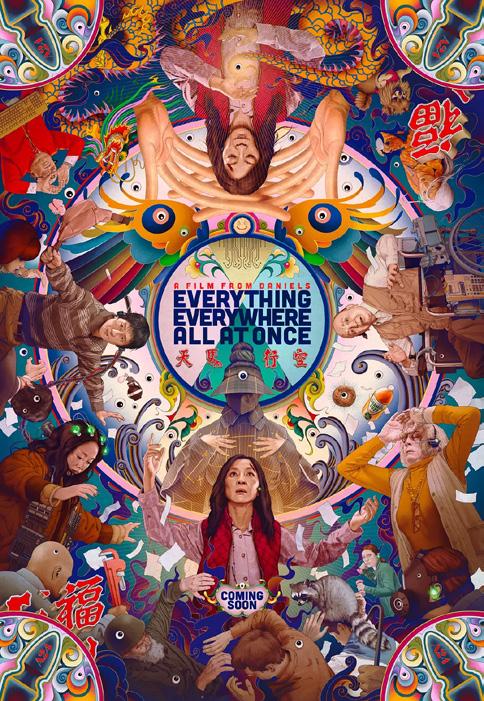


It’s definitely affirming because it makes you feel more at home in your own skin. I feel validated in my identity, which is a bit silly but it’s nice seeing people on screen who look like me. Moana was the first Disney Princess I vaguely looked like, even though she’s not my ethnicity - I oddly identify with Pacific Islander cultures because they’re often mixed Asian and I felt like I belonged in Hawaii where many people are mixed. So seeing Moana represent that, as well as indigenous communities, through beautiful art that becomes normal for young kids is really important.

Those movies make me cry because I feel seen. Most consuming the media are white and always see themselves represented, losing sight of the significance of that. It’s special seeing people who look like you succeeding in stories where it’s a given for white people.
Because those experiences seem to become too much about identity, like a mask rather than an actual identity. Figuring out who you are is hard, especially growing up, so having people with similar experiences is invaluable. I really miss my best friend in the US who has a similar background - she validates everything I’m experiencing. You can’t replace that. It’s so valuable having local Asian friends you can actually see and be with people who just understand without you explaining microaggressions or anything. A crappy experience happens and you just say “this sucked today” and they get it. With my lovely but mostly white friends here I have to explain, which is tiring when you’re already upset. Having those people around makes a big difference.
The more you talk about it, the easier it to try to figure out how you identify by personally, because them you start to process it as you speak about it and hearing other people’s experiences can help you validate your own or help you figure out maybe that’s not the way want to identify.
52
1 2 3 4
“I think I lost touch with the other half of my identity for a while. Now I’ve finally found a middle ground where I’m happy identifying as mixed race, but it can still be challenging. A lot of people look at me and say “You’re too Asian to be white and too white to be Asian” - you’re stuck in between. So it feels like neither community fully accepts you for what you are, or at least that’s been my impression, which can be a bit lonely at times when you want to feel a sense of belonging.”
1 The poster of ‘Everything Everywhere All At Once’. Copyright belongs to its production company.
3 The poster of ‘To All The Boys I’ve Loved’. Copyright belongs to its production company.
4 The poster of ‘Crazy Rich Asians’. Copyright belongs to its production company.
2 The poster of ‘Moana’. Copyright belongs to its production company.
It’s complicated - I’m like a Chinese person, but not exactly. So I end up explaining it every time.”
My mother tongue is Mandarin, followed by English, as it is an international language for those who do not speak Chinese. I can speak those two languages very fluently. Sometimes Chinese people are surprised when they realise I can speak Chinese without an accent. I have found these two languages affect my interactions with others. When I speak English with some Chinese speakers, I may feel more distant, like we cannot bond over the same mother tongue. So I will consciously adjust my way of interacting.
Hokkien, a dialect used by a specific group of south-eastern Chinese, also comprises my linguistic heritage. I use it most when speaking with my grandfather and older adults from my hometown. My parents and grandparents are entirely Chinese and descend from Chinese culture. We maintain many traditions like worshipping Chinese gods, eating traditional foods, etc. There are slight variations in these traditions between our two geographical roots.
I am still trying my best to learn Malay, Malaysia’s national language. For instance, if I meet a non-Chinese person in Malaysia, I try to speak Malay first despite my English being better. Speaking Malay makes me feel I belong. No matter the language, people tend to open up more when you share linguistic or cultural attributes.
It’s very difficult to explain the differences between Malaysian and Chinese identities. It’s not like my parents temporarily moved to Malaysia. My ancestors have been in Malaysia for so long that we are an established part of the country now. There are around 4 million Chinese-Malaysians, yet sometimes we feel excluded from the mainstream culture. For example, in the United States, some Chinese people may not seem fully American because they lack US citizenship or engagement in mainstream culture. But Chinese-Malaysians have been ingrained in the culture all along. We even participated in Malaysia’s independence from the UK, so we are truly part of this nation.

I’ve felt homesick a few times because of Glasgow’s cold weather. Briefly, I’ll think - why is it so frigid here when Malaysia is so hot? We wear shorts and flip-flops there. But I overcome those feelings by enjoying things unavailable back home, like hiking and reasonably-priced beer. Alcohol is heavily taxed in Malaysia for religious reasons, so it’s expensive. Experiencing new things here makes me happy and helps me appreciate this place more.
Sometimes after long stints abroad, I feel like an outsider when returning home. It is not my cultural identity but missing so many changes in my friends and family members’ lives.
53 TEO 20 year S old
“I’m not Chinese from China, but I’m Chinese from Malaysia. However, I feel like I have to tell others that I am not from China. I’m still of Chinese ethnicity, but nationality-wise, I’m from Malaysia.
“The way I see it, some people who aren’t part of our culture could mistakenly think it’s completely fine because they haven’t lived it. Obviously, they don’t know everything about it. But we’re responsible for telling them what’s right versus wrong. They aren’t wrong –they’re just curious. That’s how I think about it.”
My full name comprises three parts. The first is Teo, or Zhang in Chinese, my surname shared by my family. In Malaysia, the surname Zhang is pronounced as Teo, unlike in China. My ancestors hail from Fujian province’s Ming Nan yu, where Zhang becomes Teo. Thus, my surname in English is Teo, unlike most Chinese names spelt Zhang. Many Chinese people share my surname in characters yet with different English spellings and pronunciations.
The second part, Yong (spelt Yon in English), was chosen by my grandparents consulting a fortune teller after my birth. In Chinese, these tellers are called Suan Ming shi. Mine said I lacked the element of water, so Yong was picked for its water meaning.
Lastly, Quan means power or authority in Chinese - a word my grandmother liked.
“ i think the mo S t important thing i S identity i S a very S ubjective thing. w hat you think may not be the S ame a S what other S think. So the way i See it, only the opinion S of people who matter to me carry weight. i t’S like when you S tart to love your Self, and then you can properly love other S y ou have to love your Self fir S t. o ther people’S opinion S aren’t a S important a S how you feel and think about your Self. w hat matter S mo S t i S your own Self-perception and Self-love. t hat’S the mind Set i try to maintain whenever i think about my identity.”
“ it’S like a blank Sheet of paper, and people who don’t know much about m alay S ia only have a few dot S of information. y ou’re trying to connect tho Se dot S to paint a more complete picture S o people can better under S tand where you’re from - how you grew up, what Shaped you, and S o on.
i t’S about connecting the dot S to form a fuller S tory.”
54
“ aS a kid i under S tood that people were different color S , but in my head white and black and brown were like type S of chocolate. dad wa S the white chocolate, mom wa S the dark chocolate, and i wa S the milk chocolate. but we were all juS t chocolate.”
Trevor was born during apartheid in South Africa to a white Swiss father and a black Xhosa mother at a time when such a union was punishable by five years in prison. That’s why in his book, he mentioned he was “born a crime”. He was born and raised in a violent, racist and abusive environment. He mostly stayed indoors in his early childhood, because being seen by people would endanger him and his family. His parents never married and could not be together openly because they looked different. He always identified with his black identity, and was always more intrigued by the fantasy worlds of Roald Dahl, because he saw himself in those books. He specifically connected with Charlie and the Chocolate Factory because as an outsider, he grew up a poor kid but had a golden ticket to somewhere he didn’t belong. His mother tried her best to ensure Trevor wasn’t influenced by the black tax - the generations before you being pillaged, so you lose everything just trying to bring those behind you back up from zero, rather than using your skills and education to move forward.
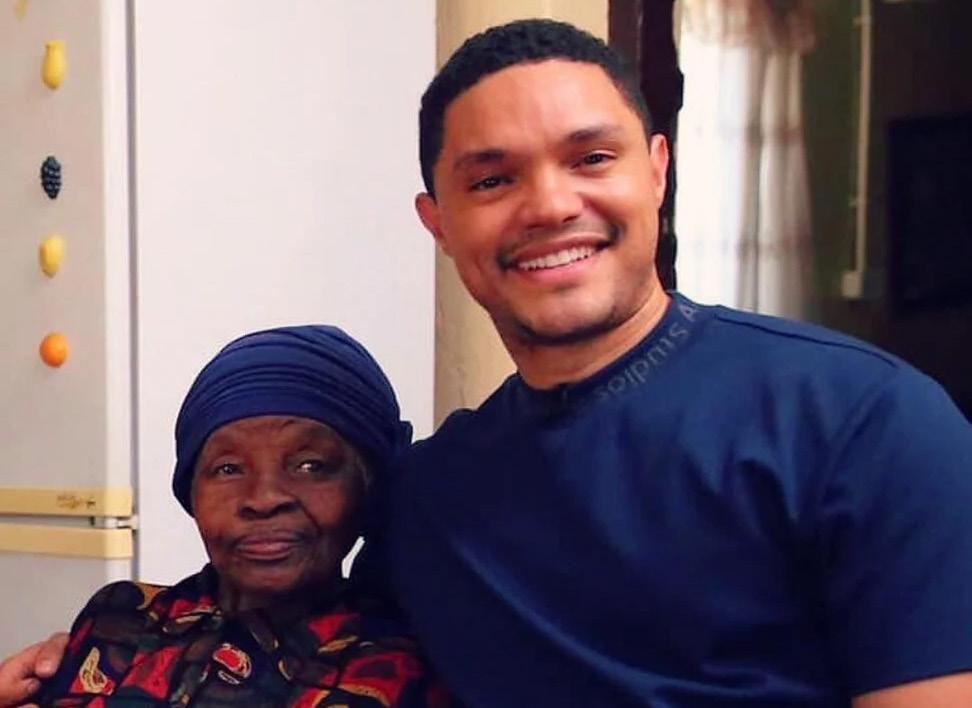
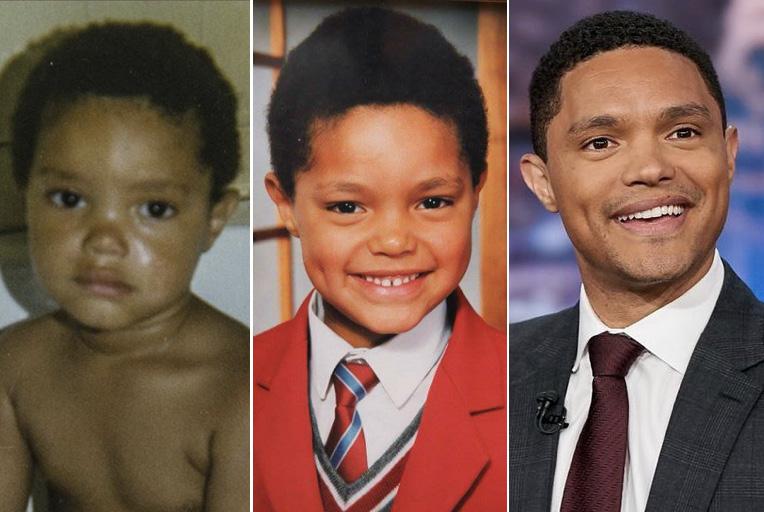

South Africa was invaded by Dutch colonisers in the 17th century, and blacks were at the bottom of society until apartheid was abolished in 1994.
Poverty becomes like a hereditary disease. Poor people lack access to quality education from young, work long hours as adults, and still carry debt, passing the cycle on to their kids. Generation after generation of South Africa’s blacks lived in poor rural areas designated by whites, did low-income work whites were unwilling to do (if fortunate enough to find work), and sent their kids to under-resourced public schools. They had no dreams of success, just living day to day.
Worse still, to secure their position, white colonisers divided blacks into tribes, stoking tensions between the ruled groups. Blacks rejected and excluded each other over disagreements and language barriers, lacking proper education. After apartheid ended, South Africa seemed even more chaotic.

55 TREVOR NOAH 39 year S old
1 A young Trevor Noah and his mother. Photo: @trevornoah/Instagram
2 The Daily Show host Trevor Noah, then and now. Photos: @katekimab; @_Mondster/Twitter, @ trevornoah/Instagram
3 Trevor Noah with his grandmother. Photo: @ trevornoah/Instagram
2 3 4 1
4 Under Apartheid in South Africa.
In South Africa, there was also significant gender inequality, with women having almost no chance for education and over 90% being full-time housewives. Trevor’s mum wanted to escape this life early, taking secretarial courses in the city herself, starting as an assistant and gradually becoming the highest earner in the family. However, Trevor’s mum still had to hand over her income to the family, with most of it going to subsidise her unemployed, alcoholic brother. Trevor’s mum’s broken Volkswagen frequently broke down, but there was no money for a new car, only small repairs again and again like throwing money down a black hole. When Trevor finished high school, selling pirated CDs and doing loans with friends to earn a living, the seemingly smart business ended with them dirt poor after one mishap. Trevor’s mum and stepdad started their own repair shop but were forced to take on the previous owner’s debts due to ignorance of the law, financially crippling the family. Trevor’s education suffered as he tried to earn money for the family, while his stepdad was constantly drunk and violent. Hidden between the lines was the poverty, confusion and generations of displacement caused by South African segregation.
Trevor mentioned mingling with black kids, shoplifting, and being quickly released as a “white kid” while the blacks faced harsh punishment or jail. At school too white kids more easily entered top classes, excelling further while poorer performers dropped out early - the racial gap grew steadily harder to bridge. His skin was a barrier but also a passport, since he didn’t belong to any one group, language connected him. He could belong anywhere.


He became a chameleon - his color didn’t change, but he could change others’ perception of it. Reply in their tongue, and he could be anyone. Under segregation, whites accessed the best education and welfare while blacks only learned basic maths and farming, victims of a system to keep them ignorant. But amidst this educational inequality, Trevor’s mother instilled precious qualities like freedom, equality, curiosity, resilience and honesty.
As Trevor said, if his mother had one goal in raising him, it was to free his mind. Even in naming him Trevor, with no origins, she deliberately avoided burdening him with any expectations, hoping he would be free his whole life.
“ y ou wi Sh to live in a world where there are only good guy S and bad guy S , you either hate them or love them, but human S are not that kind of Specie S y ou don’t choo Se where you are born, but life i S what you make of it.”
56
6 The cover of the book Born a Crime by Trevor Noah. Photo: Spiegel & Grau Publisher
5 A poster for the Netflix show Trevor Noah: Son of Patricia. Photo: Netflix
26 year S old
“ i don’t think there are too many challenge S for me in accepting my own cultural background. t he only difficult S ituation i S when i interact with taiwane Se people. t hey often a SS ume i Share S imilar thinking or political view S to them, but the main S tream po S ition and attitude S in m acau are different from tho Se in hong k ong or taiwan. w hen thi S happen S , i S top and reali Se i identify a S c hine Se, which diverge S from what they expect. i t’S a bit awkward for me to have to pre Sent or S ay i ’m c hine Se to them. So in tho Se moment S , i can only S ay i ’m from m acau.””
When this happens, I stop and realise I identify as Chinese, which diverges from what they expect. It’s a bit awkward for me to have to present or say I’m Chinese to them. So in those moments, I can only say I’m from Macau.”
My identity can vary depending on the context and people I interact with. To some friends, I simply identify as Chinese, which isn’t controversial. However, in different situations, I may present a different identity based on the conversation. For instance, if I’m in Taiwan or China, people may prefer me to identify as being from Macau, as it puts me in a unique position – one of them, but also outside of their specific culture.
In fact, I was born in Macau, so my identity is mostly Chinese since I speak the language and my culture is rooted in China. My parents also immigrated from China, making me a third-generation immigrant. Family members thought Macau offered more opportunities than their hometowns in Guangdong province.



These unique backgrounds have impacted my life. Firstly, my family taught me to speak Cantonese fluently, an essential part of my cultural identity. Secondly, I studied Portuguese during my high school years in Macau, as it retains Portuguese as an official language from the colonial era. I considered it will easier if I want to apply for a government job, but I ultimately pursued undergraduate studies in Taiwan instead. In Taiwan, I learned Japanese, prompted by my tutor’s advice that Japan’s Chinese history scholarship is exemplary. Due to early 12th-century invasion attempts, comprehensive research became a valuable reference point for studies. Now I focus on
Buddhism, which seems complex given my educational background. While interested in the supernatural aspects, my main aim is to understand the intricate relationship between religion and people, along with how religious practices function.
Based on those, To me, identity comprises broad categories like gender, nationality and age. Shared interests also create identity - if we both like Korean or philosophy, that bonds us. My identity stems from following evolving curiosities that shape me. I see it as fluid and decentralized - I can belong anywhere I forge connections through shared experiences. Taipei feels like a spiritual hometown and belonging for me because of the relaxing times and special friends there. For me, belonging equals sharing special moments and memories with people.
“ w hen i S ay i ’m from m acau, it S ignifie S that it’S my homeland, but al S o that c hina i S my homeland more broadly. however, when i ’m actually in mainland c hina, i S ometime S get that feeling of being an out S ider. i t’S like they view me a S a c hine Se per S on from m acau, which create S a bit of an excluded feeling.”
access state study abroad funding. I understand the advantages being a Chinese from Macau yet still feel the nuance of not being fully accepted as Chinese.
As someone from multiple cultures, I can be more open-minded in accepting and absorbing the best elements of each. You realize you have more opportunities and possibilities. Different experiences encourage examination of how you and others perceive identity.
Building deeper connections across cultures involves engaging with history and media like TV and meeting friends from those places. This expands your perspective.
It’s a unique feeling being Chinese from Macau, as it differs from other special administrative regions. Attitudes internally and externally vary greatly. Studying in northern China, people want me to be a certain kind of Chinese - embracing my role but not totally assimilating. This manifests through policies like special scholarships for those from Macau, yet I can’t
57
VICTOR
*
1 2
*The content in this article is summarised and excerpted from interviews and relevant books and presented for the readers. The views expressed in the text solely represent the personal opinions of the interviewees.
文中內容是作者經採訪摘錄總結,以饗讀者。 以下內容僅代表受訪者的個人觀點。
1 Old alleys of Macau, cozy and nostalgic. 2 Church
3
3 Eslite Bookstore, a 24-hour haven for reading.
I am a Malay originally from Malaysia. a country with diverse races and multicultural influences such as Malay, Chinese, and Indian. Growing up, I was exposed to both Western and Asian cultures, both within my family and in my surroundings.
When I was 16, I had the opportunity to participate in a student exchange program in Japan. Living with my host parents, I immersed myself in Japanese culture and even learned a bit of the language, although I have since forgotten it. One unique aspect of Japanese culture that stood out to me was the practice of keeping the shower water for the next person, which means that the last person to shower might end up using cloudy water.
While I enjoyed this cultural experience and appreciate that as the cultural norm everyone followed, it’s just not something I would personally continue.
My identity adapts depending on the location, so I have learned languages such as Arabic, Japanese, Mandarin, and English. This trait also runs in my family, as my uncle learned Mandarin to communicate with his Mandarinspeaking friends and read newspapers. An aunt of mine resides in Japan and is married to my Belgian uncle, which made a significant impression on me.
As a child, when my uncle spoke English, I couldn’t understand anything and would simply nod along. However, when I learned English, it became a tool for me to engage in conversations and connect with English-speaking individuals. In my classes and social circles, I often encounter people from diverse backgrounds who speak English at different proficiency levels. To me,
accent and grammar are unimportant; the focus is on communication.
I have a deep appreciation for immersing myself in different cultures as it allows me to understand diverse ways of living and ultimately helps me embrace my cultural heritage.
I began independent travel at seventeen and have combined these experiences to shape my identity. However, this path has not always been easy, especially when it deviates from the norms of my Asian family.
Returning to Malaysia, I found myself concealing my identity from others, particularly from the expectations of being a typical Malay person. It was a struggle I faced for a long time.
Discovering my true self took time, and there was no need to rush the process. I didn’t know myself before because it wasn’t how I presented myself. I used to dress in a unique and eccentric style, and looking back now, I realize that it all had meaning in shaping who I am today.
From experimenting with outfits and hairstyles during my youth to making choices that felt right, these experiences have allowed me to evolve and establish my identity.
This is who I am, and if it doesn’t resonate with others, it’s not for them to judge or look at.
’I’ve been Zaim.’’
My name is Ahmad Zaim Zarif. Its have the following means, highly praised; Leader and elegant& funny.
Zaim was a child who was fun, loved to smile, was quirky, obeyed his parents and who was very soft-hearted; he was, indeed, an introvert and always in his own world.
But I don't remember what Zaim looked like years ago. I woke up and found myself in a new body, a new person. I changed my name to Zaym.
I forced myself to quit and start to design a new version of Zaim, I strive to be a 'new' person because I fled from the anguish I felt unconsciously at that time. The pain has altered individuals, I guess, and it has an effect on me.
This is the closure I need in order to make peace with myself. I introduced a little bit of Zaim into Zaym, and I'm happy that Zaim taught me so much about being kind.
“This is me now. We never know what will happen.”
1 With my brother (on the left) and me (on the right).
2 My cousins and I with grandma (archive photo).
3 Me in Japan, 2013.
4 With my foster siblings in Japan, 2013.
5 My foster parents in Japan, 2013.
6 My biological family in Malaysia.
7 With my grandma in Belgium, 2023.
8 With my baby cousin in Belgium, 2023.
9 With my 3rd aunt in Scotland, 2018.
10 Me now, 2023.
58 26 Years Old
“I mean, Identity takes a lot of experimentation. So it takes time. There’s nothing to rush in identity formation…”
ZAYM


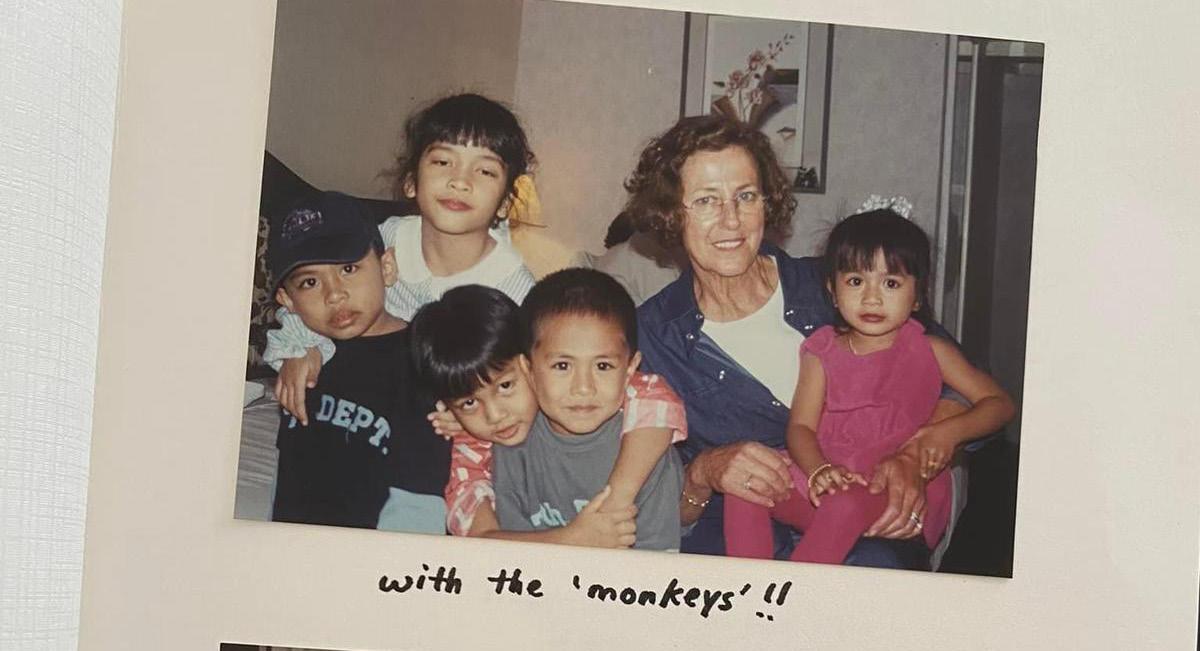


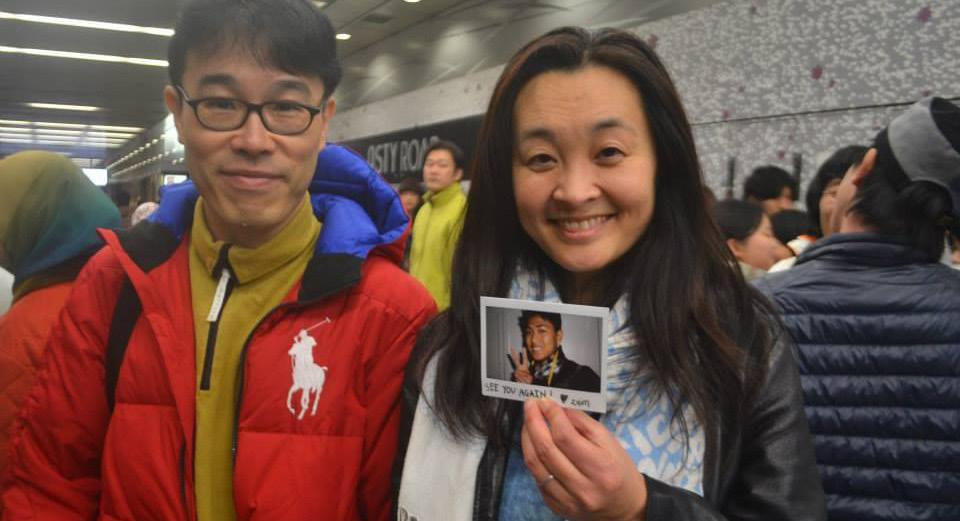
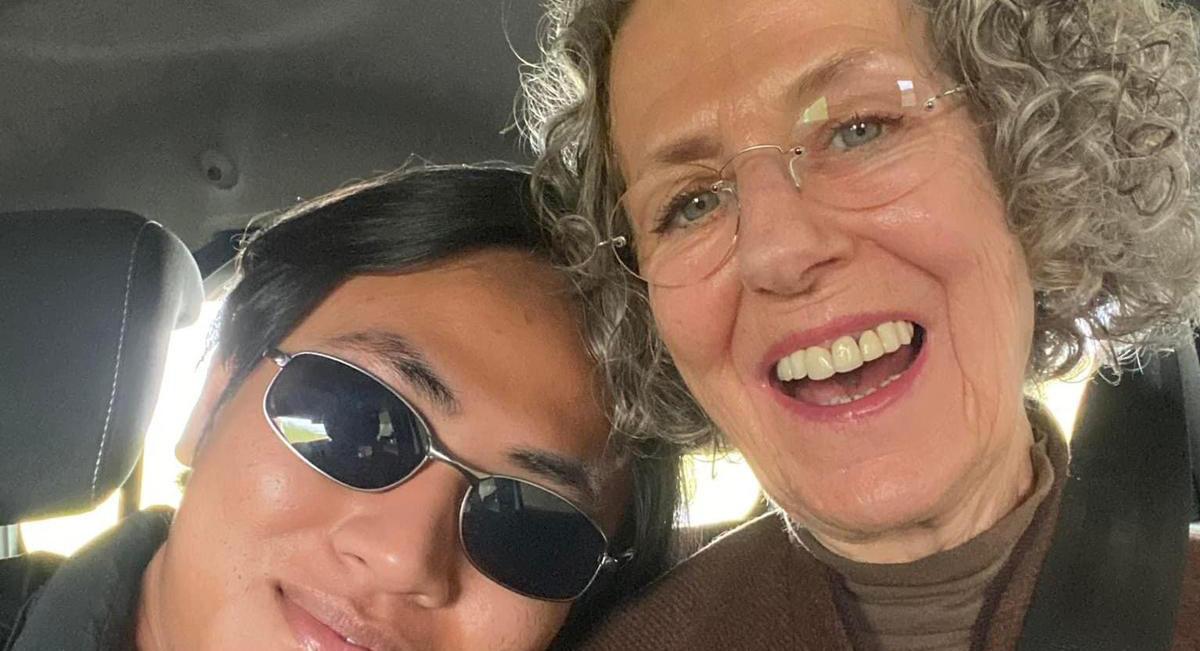
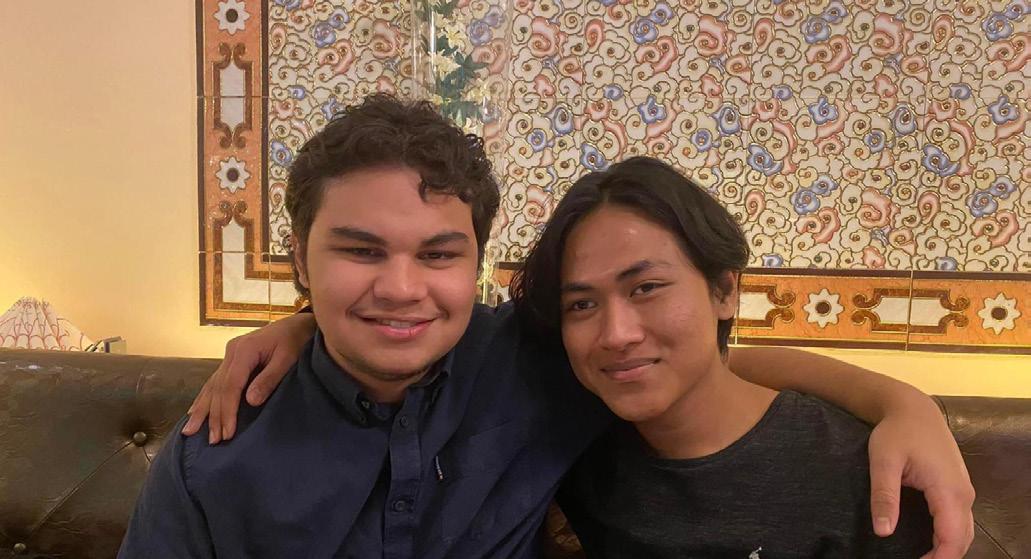


59 1 6 7 8 9 10 2 3 4 5
I spent half my life not in my homeland. I spent five years in Italy and eight years in the States.
When I was 18, I moved to Florence, Italy to study art and design at university as an undergraduate. This was my first experience living abroad, and I stood out as a foreignerpeople saw me as just ‘Chinese’, originally from China. There was an image of the Chinese as rich tourists buying up luxury brands at that moment. I was given the Italian name ‘Alessandro’ by my professor there and went by it during my five years in Italy.
In Italy, I was quite simply a foreign student, whereas in the US I felt my identity shift to being Asian American. And at that moment I was also different from Asian Americans or American -Born Chinese, which shows the complexity between my national and cultural identities. Most Asian Americans are either first-generation immigrants whose parents were engineers or other highly-skilled professionals or immigrants who came to run restaurants and small businesses. But I am different - my family has been in my country for multiple generations, and I grew up with financial support from my parents. So while many 2nd or 3rd generation Asian Americans have backgrounds similar to mine, the complexity of my personal identity and experiences is not easily summed up. There are nuances between my national and cultural identities that make simple comparisons difficult when discussing my heritage background in that situation. The interplay between my family history over multiple generations, my upbringing, and my ethnic heritage shapes who I am in complicated ways.
When I stopped using that English name Alex to shift to my real name, it gave me a different sense of confidence in my identity in many other ways as well. I have had so many used names, those names all came from my family wishes and Chinese culture traditions important to me. According to yin and yang, my destiny had a lot of ‘fire’ in it, so a name connected to ‘water’ or ‘tree’ like Ziyang (which means ‘tree’ in Chinese) would help calm that down. Amazingly after getting this new name, everything in my life improved - I became much healthier, studied harder and got better grades. Adopting my Chinese name was symbolic of me gaining confidence in all aspects of my cultural background, even as I was living in a new country. That confidence has stayed with me since.
When asked where I’m from, I always say I’m originally from Xuzhou, though I’ll compare it to major cities in China


or relate it to a American county if people don’t know it. I don’t mind follow-up questions, since I ask the same when getting to know someone - we all have interesting geographical origins. As for describing my cultural heritage, I focus on the complexity between my national identity as Chinese versus my cultural identity as Chinese American. Artistically, I examine this conflict and mixture of influences. In China, we didn’t emphasise identity like in the West where it’s encouraged. Yet too much political correctness in the West also limits deeper conversations about culture.
When I was in the States, I wanted to join protests and cared about issues facing my fellow Asian and Chinese friends. Before Covid, there wasn’t as much anti-Asian sentiment, but afterwards, attacks increased and the ‘Stop Asian Hate’ movement grew. So, I’ve never really struggled to accept my cultural background - it was more about figuring out what it was in the first place. Identity is so fluid based on the time and place.
And it was hard at first to figure out exactly what my identity was, but after some reflection, I find it pretty straightforward. This is because I don’t see it as being about me as an individual. We are culturally and socially constructed beings - our sense of self and beliefs tend to shift over time. So when I say “I”, there never really was a fixed “I” there to begin with. Our notions of cultural background are fluid too. The meaning of being Chinese today is different than 10 years ago, just as perceptions of Russia have changed dramatically in the past decade. These group identities are always shifting. So while it took some time to sort through, I feel comfortable with my mixed cultural heritage because I know it’s not rigid - it evolves along with the world.
I don’t feel 100% Chinese or American, but that total comfort and sense of fully belonging is something I’ll likely feel when extremely settled into a place. I may sometimes feel singularly aligned, but identity is ever-evolving.
60
ZIYANG 33 year S old
“When I first went to the US, I started using the name Alex. But when my new classmates asked what my real name was, since I was clearly not Alex, I told them my name is Ziyang. That was a small but important moment for me. It marked a shift - from using an English name to embracing my true Chinese name.”
1
1 Xuzhou. (©Google Map)
Food is deeply connected to cultural identity through the unique histories behind dishes. In Florence, Italy they have signature foods like Bistecca Fiorentina (Florentine steak) and Lampredotto sandwiches made with beef intestines that represent local culinary traditions. I remember visiting the island of Elba, where Napoleon was exiled. When we ate at restaurants there, locals shared food histories about Napoleon’s time on the island. So you can find culturally unique stories behind all kinds of foods. The histories and anecdotes connected to dishes provide a window into a culture.
In the US, food becomes even more culturally unique and specific. For example, I lived in central Brooklyn, and there is a fried chicken shop near my home where Jay-Z used to work when he was starting out as a rapper. So when I eat there, I think about the history and connection to hip-hop culture. We all have stories like this about foods representing diverse cultural identities. I think each of us could talk endlessly about dishes that relate to certain cultures, because every single food has some history or significance behind it.

Then there is General Tso’s chicken(左宗棠雞). I think every Chinese person in States has eaten this dish that everyone knows. There was a documentary talking about the first generation of Chinese immigrants in the US opening restaurants. It asked why in the end all these restaurants served the same dishes - why do all the Chinese American restaurants have General Tso’s chicken on the menu? Who even is General Tso?
The documentary traced how the dish is originally from Hunan province in China. Then a Chinese immigrant who went to Taiwan put his own spin on it, making it really sugary. This bloke later immigrated to New York and opened the first restaurant serving General Tso’s chicken back in the 1960s. From there, the dish just grew in popularity until it became this ubiquitous Chinese-American staple.
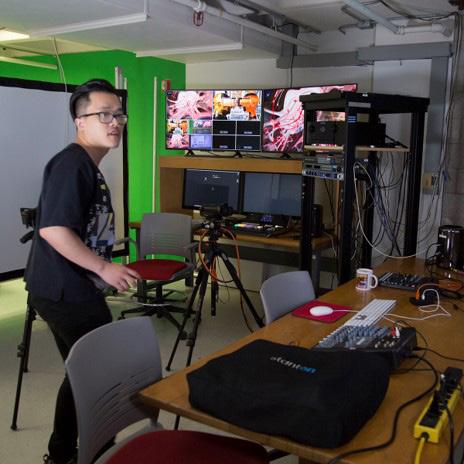
So I find this really interesting as an example of food and cultural identity. General Tso’s chicken only exists outside of China - actual Chinese people don’t eat it. But it became this famous “Chinese” food in America.
Now things are changing again - Panda Express even brought General Tso’s chicken back to China by opening a shop in Beijing. Chinese influencers flocked there to take pictures, even though Americans don’t love American-style Chinese food. It’s like this reverse cultural exchange, with the dish representing evolving identities. I just find the winding story of General Tso’s chicken really fascinating as it relates to identity.

61
“I remember my first week at RISD when a friend from Pittsburgh took me to a restaurant. When I asked what General Tso’s chicken was, he was shocked and said “It’s Chinese food!”
I had to explain I had never heard of it before. It’s seen by many Americans as authentically Chinese, but it’s completely unfamiliar to people from China.”
2 In the Studio.
3,4 With Rhode Island School of Design Classmates.
2 3 4
For years I felt New York was my hometown, yet I was always an outsider there too - it’s such a vast, global city where everyone feels a bit disconnected. When I used to live in America, each time I arrived at the New York airport, I would think “I’m back.” But back to what? What does that even mean? And next month if I go back to Hangzhou, I’ll have the same thought, “back to Hangzhou.” But all the things there, my colleagues, friends, and possessions, feel transient and contingent. My general feeling is that nothing is stable or permanent. I think this nomadic perspective comes naturally from the way I’ve lived.
And that lifestyle actually gives me an advantage as an artist. I’ve thought about the concept of ‘otherness’ - how artists often highlight their specific minority identities. But there could be more nuanced takes on being an ‘outsider’ versus belonging. Personally, I’ve never felt a strong sense of belonging to one place. As an artist I can work anywhere with just my laptop, and I see the places I’ve lived as transient. And being an outsider can provide useful distance to observe and critique societies.
In some ways, being an outsider has been beneficial for me in China. As someone with an outside perspective, people are interested in my thoughts and information. This distance gives me a unique viewpoint. Initially though, feeling like an outsider was tough - thinking differently made me feel I didn’t belong. My sense of being an insider or outsider shifts depending on the context.
I spent my early years moving around frequently with my father’s business, living in northern places like Harbin, Shenyang and Changchun for about a year total when I was four years old. My dad had been a performance artist himself when younger. I think he gave me the artistic spirit and taught me I was an artist and different. I think this instilled an early rebellious, antagonist spirit in me that became an important root as I grew up.
And in art, there’s a major focus on “otherness” - highlighting one’s unique identity or marginalized experiences. It’s almost as if having the most specific intersection of identities will make the coolest art. For example, being Asian, queer, and disabled could make someone the “queen of the art world” because of their complex identity.
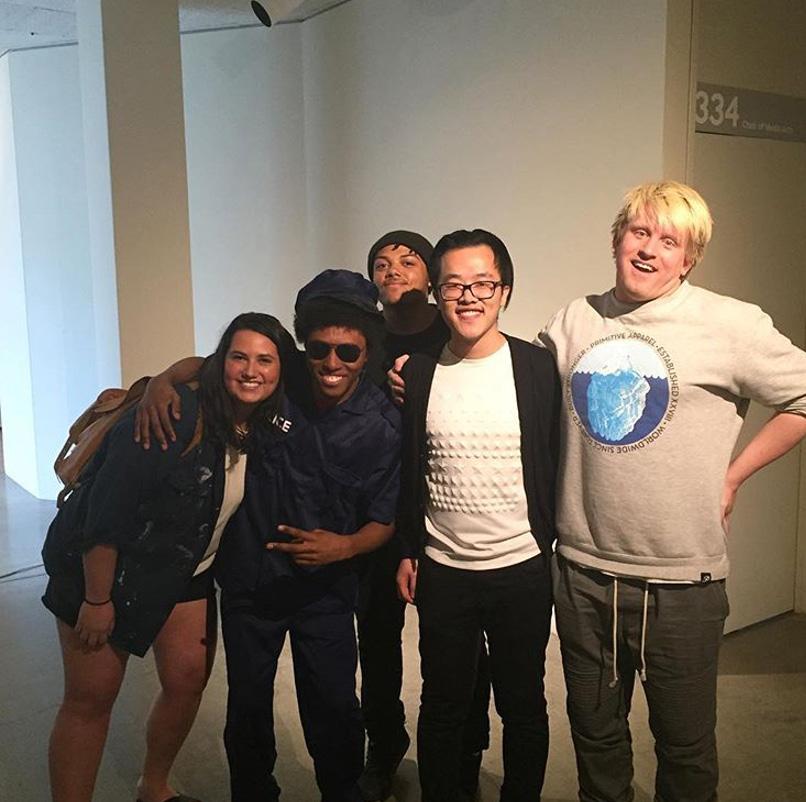
While I understand this impulse, I think the connection between being an outsider and embracing otherness is more nuanced. There could be a more complex and interesting
conversation about these topics beyond just celebrating one’s uniqueness or minority status.
My own relationship with being an outsider, whether in China or elsewhere, has led me to think beyond these simple narratives we often construct around identity and belonging.
I used to feel quite antagonistic and rebellious, wanting to make art that asked tough questions. But as I’ve grown older, I’ve shifted to wanting my work to have positive social impact. So the ‘antagonist spirit’ is still my root, but now the trunk is more about influencing culture and solving problems through avenues like education. I became a teacher to hopefully create change beyond just questioning things. I aim to connect my work across different communities for greater impact. So while I don’t feel settled in one place, I hope I can leave a meaningful mark by empowering others and building cultural bridges.
some clothes, and a single suitcase - the essentials I need for work and artmaking. ”

62
5 6
“ The title of my recent solo art show is “Cloud Native Nomad” which I feel describes me well. Being a nomad means moving between different countries, cultures, and places, or even navigating between various disciplines and professions. Because of this constant motion, I have never felt a strong sense of belonging to any one place. For example, if you asked me to move somewhere new, I could easily do it with just my laptop,
5
With Minneapolis College of Art and Design students.
6 The Poster of the Solo Exhibition in Shanghai.
The work began with the collection and collation of various news and social events that have occurred or are happening based on social media algorithms, and utilized dreamfields3D to generate 3D models using the titles of news/events as the seeding words/sentences. In the era of AI technology blowout (but also in its “baby-like” era), the work records all kinds of human information as “AI fossils” through AI text to 3D model generation technology. In the future “abandoned factory” scene that is mixed with reality and virtual, it is full of different experiences between humans and AI on the same event. Human information is presented as some realistic fragments, some historical fossils, a pile of metal carvings, or a pile of inferior plastic toys. Participants can find their original text by approaching each “fossil”, and they can also dig out stories that have become grand, obscene, meaningful, exciting or moderately boring in the AI generation process.

Future_Forecast is a project that includes a live simulation + collective world building game, a CGI film, and a series of characters. In the context of “Digital Earth”, “One Belt One Road Initiative” and the Philippines’ “Build Build Build Initiative”, Future_Forecast presents and predicts the evolution of cloud networked societies in the developing world by looking at the effects of growing Internet-enabled networks and the ecological, geopolitical, and socio-cultural effects of a speculative future ISP and blockchain company in the Philippines.
Based on Benjamin Bratton’s Stack theory, the project builds a 6-layer structure (earth, cloud, city, address, interface, user) as an interactive platformer on the Metaverse, and presents it in the form of real-time data simulation + collective world building.



63 7 8
7 Event Modeling – AI Fossil 2023 Interactive digital environment Infinite duration ©ZiyangWu
8,9 Future_Forecast
Ziyang Wu + Mark Ramos
Live Simulation + Collective World Building Online Game, 2022
Game Development: Jiahui Zhao
NFT character design: Ziqi Wang, Kexin Mao, Hanxiao Ge ©ZiyangWu
9
* The description and samples of the work featured in this collection are sourced from the artist’s personal website.
“If you were a tree, how would you explain to others where your leaves, trunk, and roots are located ? ”
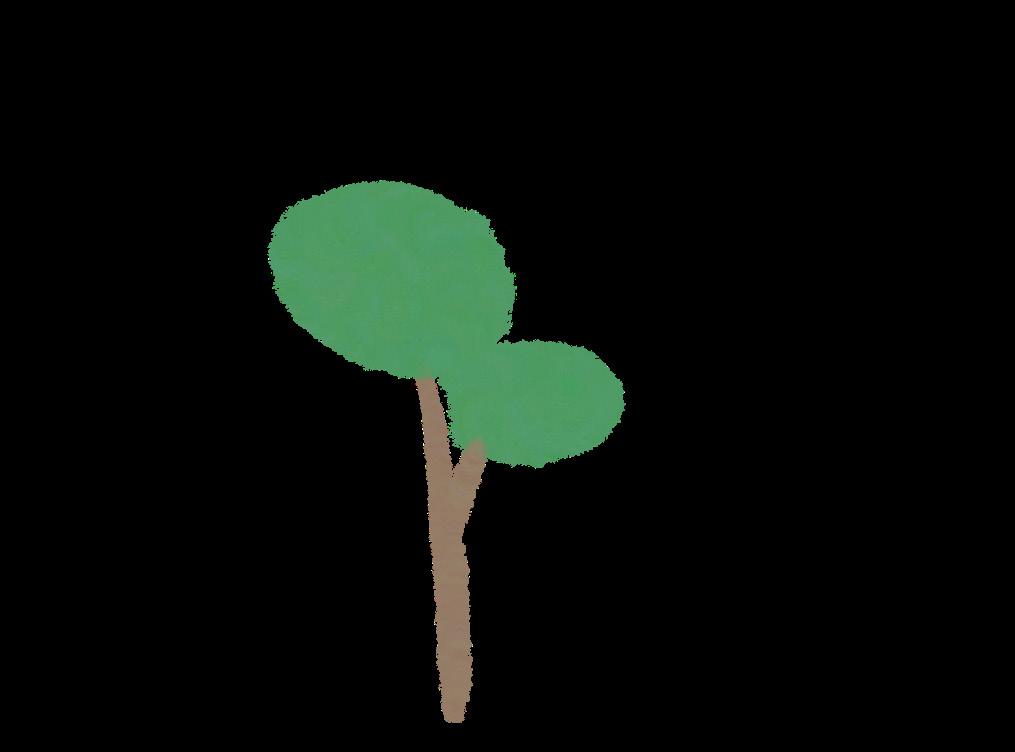


The leaves would be located wherever they can reach sunlight to keep providing and nourishing others, even in death.
The roots are buried with the person's body, absorbing their legacy to grow and carry on their memory and impact on future generations.
My leaves are in the emancipatory struggles for liberation that peoples across the world have engaged in, and the radical intellectual traditions of socialism, black activism, feminism and anti-colonialism that shape my thought.


My trunk is where I am right now, which is here in my room - that moves around.
My roots are spread across the southwest of England and the former British Empire, shaped by that postcolonial multicultural community. They also extend to the Netherlands, Germany, and the US where I've spent time.
My leaves are in Scotland where I am now, just trying to survive with no sun - getting whiter every day but still finding my own sun.
My trunk would be either my country of New Caledonia or the broader region of Melanesia where I lived and worked for 3 years across the culturally similar islands.
Cheyenne
My roots are in my hometown where I spent my formative years and still picture when I think of home, even though my parents have moved.
My trunk represents my own resilience and strength to withstand difficulties, having endured a tough upbringing but staying on a good path.
My roots are my parents, providing a stable core that I can always come back.
My leaves are made up of all the different places I've been and people I've met that color and shape my life. They represent the unknown future, always growing and changing - sometimes small, sometimes brown, sometimes falling off.

My trunk is truly in the UK where I live now in the south in Bristol, I can't imagine living anywhere else really, not even Scotland.
My roots are everywhere - in Sheffield, Yorkshire, Nigeria.
My leaves are located wherever I'm heading currently very Scottish as I care deeply about this country.
My trunk represents who I am, showing the years like rings on a tree - with Romanian childhood, English university, and strong Scottish years of career progress.
My roots have a Romanian backbone structurally, holding qualities like resilience and directness, though now more Scottish as I've made a home here.
64
Alma
Elena
Cassius
Catherine
Aman
My leaves are Scottish, now
My leaves are what's coming next, the unknown future.
My trunk is my strongest Portuguese heritage.
My roots are in Venezuela for sure.
My trunk is in the UK.
My branches are kind of Spanish. My branches are in Scotland, Glasgow. My roots are in India.
My leaves are an extension displaying my roots, showing elements of my past experiences.
My trunk represents the rings of my past experiences over the years.
My roots showcase my background and what I have gone through.
My leaves are everywhere, representing the unknown.
My trunk is my body and beliefs, nourished while growing up in Taiwan.
My roots are my feet, what grounds me. I'm still finding my roots.
I'm not a tree, I'm more like duckweed - just little leaves floating on the surface in different places.
There's a leaf in New York, a leaf in London, a leaf on my farm. I'm happy having parts of me spread out, hopefully growing and feeding back to the other leaves.

I want to keep growing new leaves, with the main branch focused on Scotland for now. That's where I could grow a community and eventually call home, without getting rid of the other leaves already sprouted in London, Glasgow, and New York.
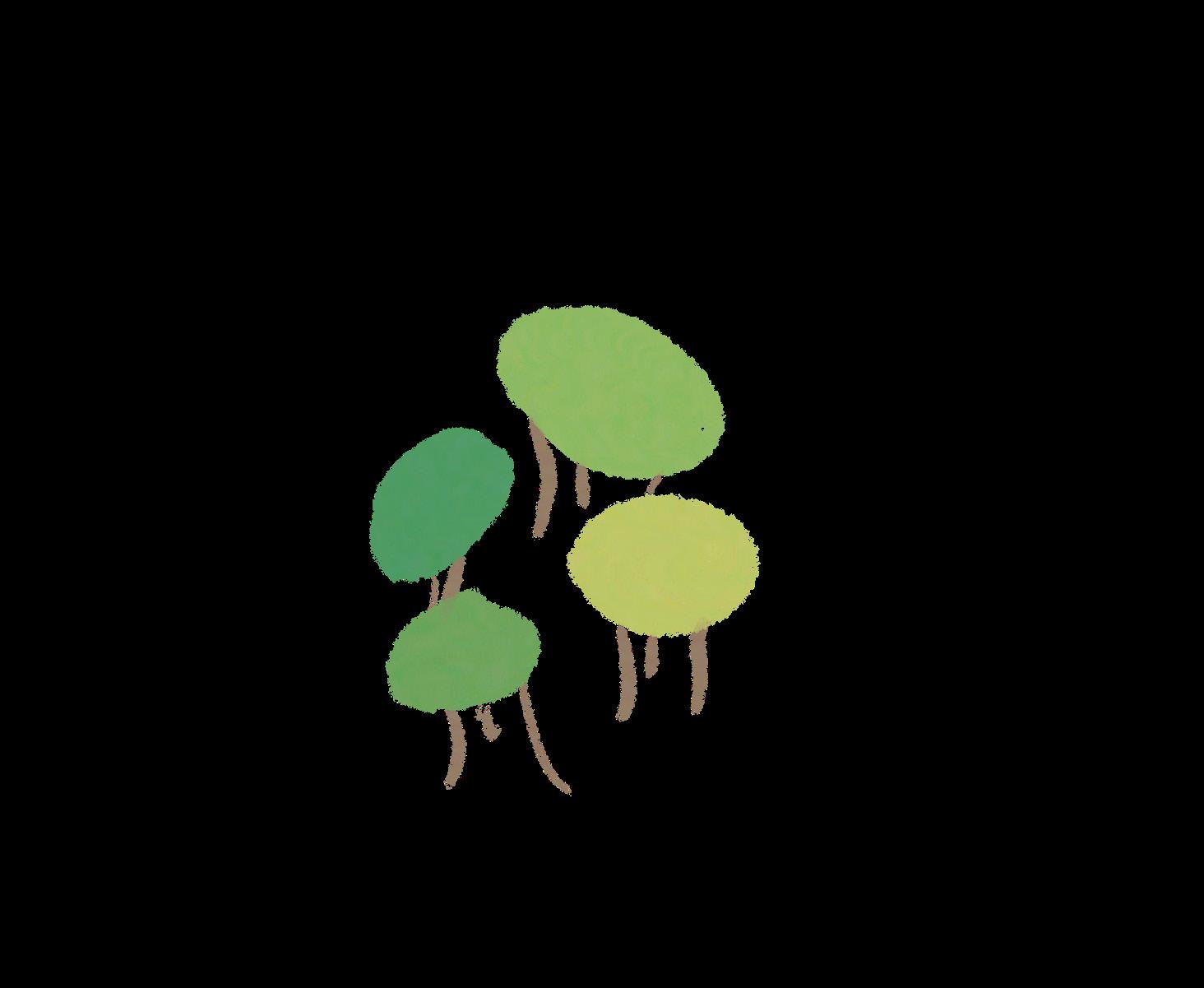




My leaves extend to Africa, like Kenya and Malawi.
My trunk is quite big across the whole of the UK, from England up to Scotland and Northern Ireland.
My roots are in Japan - short roots.
65
Estefany Jomar
Luna
Mark
Mia Mio
My leaves are outside of China, as I'm feeling rebellious and now I want to be outside of it.
My trunk is in Beijing where I developed my ideas.
My roots are definitely in China, maybe specifically in Henan.
My leaves are where I am now and the people I've connected with in life who've experienced what I havethey're how the tree has flourished. I can't grow without leaves - the people in your life who help you survive.




My trunk is likely where I grew up in the Pacific Northwest of the US, in Washington and Oregon.
My roots and origins are in Japan and Europe, and Britain and Germany for my white side. You can't have a tree without roots in your heritage.
My leaves are how I present myself - my personality that others perceive.

My trunk is my personal values and how I sustain myself - prioritizing family first, then friends and those with shared interests. I'm quite selfish and only help those I think deserve it.
My roots are my cultural heritage of being from Fujian, keeping our religious traditions and family-centric values.
My body/trunk may be in Macau but my heart/ leaves are often not - maybe in Taiwan, China, or France. I really love France - the attitude, philosophers, and culture truly resonate with me.
My roots/trunk span multiple cultures that I mentioned - Japan, Korea, France, China - with the core likely being China and France.
My leaves are wherever I am right now - if I'm in the UK, my leaves are here, but they change when I travel, like leaves that wilt and fall off.
My trunk is everywhere, all the places I've been.
My roots are from Malaysia.
My leaves are my work with new media technologies. I use these new tools to spread my message and create the change I seek.

The trunk has now grown into a desire for social impact. I aim to create cultural change and solve problems through avenues like education.
My roots are my antagonist spirit. This rebellious drive is how I was raised, moving to different cities with my avant-garde artist father. He taught me to leave my trace and ask toughthroughquestions art.
66
Rachel Stephanie
Teo
Victor
Zaym
Ziyang
“If you were a tree, how would you explain to others where your leaves, trunk, and roots are located ? ”
What is your story?

67
68
FUTHER READING
I was fortunate to know most participants through social media and mixed-race organisations. I am honoured to have collaborated with these individuals. We all believe in the power of storytelling to help others with similar backgrounds feel less alone as they struggle with complex internal questions. Storytelling can also open new perspectives for those without such experiences.
One can see how an individual’s environment - their family or society - influences them. That is why I included the historical timeline from 1925-2023, spanning my participants’ birth years, at the front. Everything in daily life affects our sense of self - a chain effect.
We are not uniquely special, just influenced differently during our formative years. There is a resilient sense of identity across diverse regions, countries and generations. We have learned from our ancestors’ varied experiences. There is often a contrast between inner emotions and the complex outer world. I tried my best to summarise these 26 stories in English, which is not my native language. Some minor sentiments or impacts may be lost in translation, but I believe these stories convey the courage and insights of all my collaborators to those who need them.
Over the past years, I have read and researched many literary works and art pieces relating to this subject. I would like to use this space to recommend some works by other writers or artists who have articulated their own or others’ multicultural identities. They use different methods, mediums, and metaphors to grapple with identity, race, and inner conflict. The biographies demonstrate how history leaves its mark on individuals, while other more philosophical works approach questions of self and belonging through an ontological lens. Everything is connected - nothing begins at a sudden point.
Angela Hui- Takeaway: Stories from a Childhood Behind the Counter (2023)
Benjamin H. Bratton-The Stack: On Software and Sovereignty (2015)
Cathy Park Hong- Minor Feelings: An Asian American Reckoning (2020)
Fran Martin- Dreams of Flight: The Lives of Chinese Women Students in the West (2022)
Geroge Konrad-A Guest in My Own Country: A Hungarian Life (2007)
Giulia I. Preponis- Mastering the Art of Mixed Heritage and Cultural Identity: A Recipe Book (2022)
Hualing Nieh Engle- Mulberry and Peach: Two Women of China (1976)
Hualing Nieh Engle- Three Lives, Memoir (2004)
Jimmy O. Yang- How to American: An Immigrant’s Guide to Disappointing Your Parents (2018)
Konrad H. Jarausch- Broken Lives: How Ordinary Germans Experienced the 20th Century (2018)
Liu Yu- Politics Is the Art of the Possible (2022)
Michelle Zauner- Crying in H Mart: A Memoir (2021)
Mira Jacob- Good Talk: A Memoir in Conversations (2019)
Naomi Evans and Natalie Evans- The Mixed-Race Experience: Reflections and Revelations on Multicultural Identity (2022)
Orlando Figes- The Whisperers: Private Life in Stalin’s Russia (2007)
Simu Liu- We Were Dreamers: An Immigrant Superhero Origin Story (2022)
Trevor Noah- Born a Crime: Stories from a South African Childhood (2016)
Ziyang Wu- The Last Subway (2017)
Ziyang Wu- Where Did Macy Go? (2020)
69
70
EPILOGUE AND ACKNOWLEDGMENTS
I completed this project when I turned 24 years old. I have contemplated my identity and heritage for a long time, since becoming aware of it. It is neither very early nor very late, but perhaps the right time. I sometimes feel a sense of fragmentation and rebuilding of myself. I will always look in the mirror and ponder who I am in the world. Most often, I tend to conceal these thoughts and ignore them altogether.
While studying at GSA, my identity became more complex. I was seen as an Asian student and faced some complex racism during this period. These experiences provoked anxiety about the future and negative feelings. They also compelled me to re-examine this question further. At times I feel I am both the majority and a minority simultaneously. I will never be a very typical example of a mixed-race, third-culture individual.
Feelings of anxiety and identity crisis have been passed down through the generations of my family. The more conversations between my father and me in recent years, the more powerless I feel. It seems we never had the chance to decide our true selves. There is an invisible hand influencing this complex subject through the broader environment. Everything is interconnected - no event or circumstance occurs in isolation. We could see that through a glimpse of the complex unity underlying our shared human journey.
From childhood until now, I have always chosen to read biographies and other books to explore my identity and new worlds. I believe this was the first gift from my grandfather. I could always find such books on his bookshelf, perhaps he used reading those as an exploration too. I learned there are many influences on identity – history, politics, family, personal initiative, and more. I realised each generation sees this topic differently.
With these experiences swirling in my mind, I want to collaborate with mixed-race, third-culture people for my graduate project. I wanted us to shape our own image in this world - one that embraces the complexity of our realities, giving voice to stories often left unheard.
Might you read these words and find echoes of your path. May your thinking shift, your perspective expands, as you connect with these lives. Those ripples of insight, carrying far beyond the page, are the outcomes I long to see.
For I believe each of us contains multitudes, irreducible to simplistic categories. Between presumed poles exist infinite possibilities.
Such is the resilience of human beings, the common current that runs through our stories. However distinct, these shared roots bind us.
71
In closing, I want to thank everyone who took the time to read our stories. Thank you for joining us on those profound life journeys.
Thank you to all my interviewees who dedicated their time and support during this long process, and for providing invaluable memories, stories and photos to collaborate with me, and for their willingness to share those with readers.
Thanks to the Val Hoskins Chair, who for and on behalf of People in Harmony, included me as one part of this 51 years organisation for mixed race people, families and couples, to give me enough knowledge and a united feeling through this long process.
Thank you as well to all my GSA tutors from my first semester until now. You have all inspired immense thinking around art and design. All of you have generously taken the time to answer my endless questions, which I greatly appreciate.
In particular, thank you to my graduate supervisor Leah Lockhart for the inspiration and insights throughout this project, and for your patience with my concerns and questions. Thank you to my major supervisor, Mafalda Moreira, without whom I could not have built steady foundations of collaborative design and ontological, relational thinking.
Thank you to my ethnography course tutor, Georgina Nolan, who guided previous research on bilingual couples and laid the groundwork for studying multicultural individuals.
And thank you to all my friends who always support and care for me during this long, lonely process. I feel fortunate to know you all and have you in my twenties. I hope we can all find and make real the things we seek.
Lastly, thank you to myself for not giving up during this challenging process. Before starting this project I was lost in an identity crisis, and now I feel grateful to be multicultural.
Thank you to everyone I have met along the way.
72
Thanks to my endless energy source – TWICE
I could not have made it through so many late nights without them.
73
I used to always pinch my nose Twenty times before I sleep ‘Cause Mom said it would make me look Just like all the girls on the screen But twenty years has passed And I still look the same (mm-mm)
Had an accent as a kid
Took five years to get rid of it Take it as a compliment
When they think I’m American Oh, land of the free Just not for me
Don’t ask me where I’m from
I don’t know what to say
‘Cause the place where I grew up thinks I have changed I can barely talk to Mom
Use English every day
But the people here still laugh at my real name
So, where can I go
If I’ll always be a stranger in my home?
And I still think of seventh grade Grandma packed my lunch that day Friends made fun of how it smelled I laughed along and threw it away And, still, to this day I miss how it tastes
So, I’m pretty for an Asian So, I’m smart, but that’s a given I’m not special, I’m just different You’re not racist, just a question
Must be nice to be included
Not because you are the token
I’m not special, I’m just different I’m just different
Don’t ask me where I’m from I don’t know what to say (ah-ahh)
‘Cause the place where I grew up thinks I have changed (Thinks I have changed, yeah) I can barely talk to Mom
Use English every day (oh, every day) But the people here still laugh at my real name
So, where can I go? (Oh, woah)
‘Cause I never seem to be enough for both So, where can I go
If I’ll always be a stranger in my home?
-the american dream’s lyrics
Song by sundial, 2023
74
Rebecca Xu 04.23-08.23
MDes Design Innovation & Collaborative Creativity



































































































































































































